What are Online Travel Agents (OTAs)? A Guide for Tour Operators

By Kevin Tjoe — 26 May 2014
agents distribution OTAs tourism business strategy
Updated April 2023 – Online Travel Agents (OTAs) can provide your tours and activities with massive exposure. To distribute tours and activities globally, you’ll need to partner with them, so here’s everything you need to know about working with OTAs, how they differ from partnering with travel agents , and the meaning of OTA in travel.

What is an OTA in travel?
Online travel agents are basically traditional travel agents, except customers self-serve, as they operate online. They are websites where consumers can conduct multiple searches, and plan and place an order for a booking.
Popular OTAs for tour operators
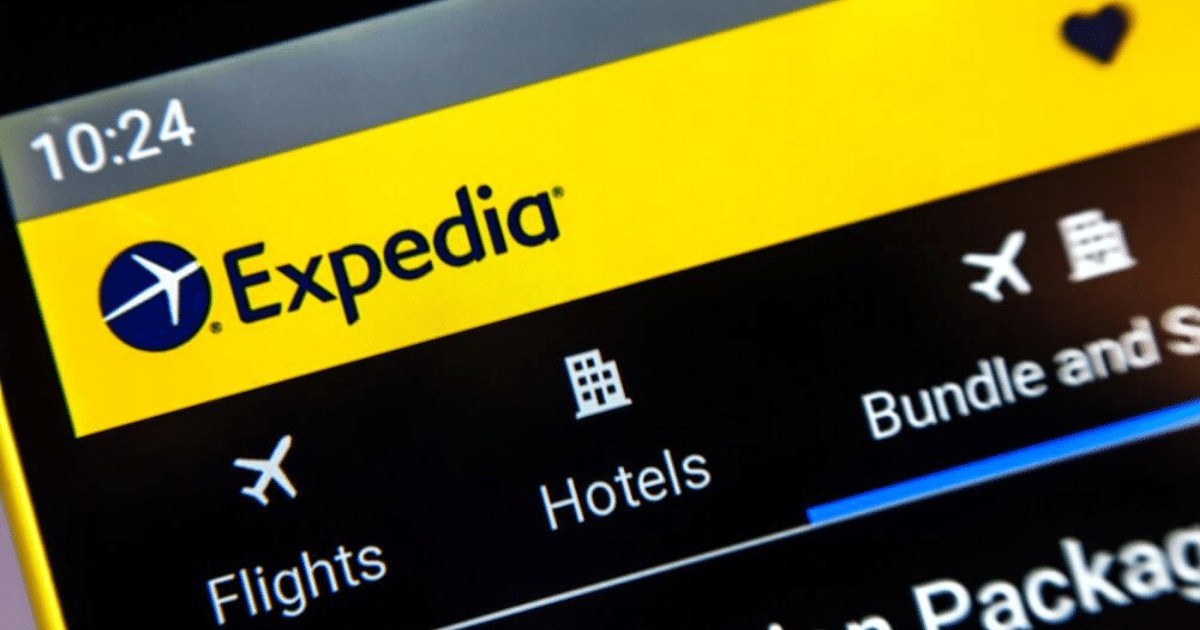
With a global presence in over 70 countries, Expedia receives over 58 million unique visitors each month, and its mobile apps are downloaded nearly 80 million times at a rate of over 200 downloads per minute. Apply to be listed on Expedia here!

Unlike Expedia, Viator is wholly focused on tours and activities. It sells its products to a global consumer base at Viator.com, 60 additional consumer-facing websites, mobile websites and apps, and through its global network of affiliates. Viator’s listings are supported by more than 500,000 reviews, photos, and videos posted by travelers. It boasts 7 million visitors per month. Apply to be listed on Viator here!
Get Your Guide

GetYourGuide focuses on listing activities based on where they are, rather than specifically what they are. This captures the market of people who decide what they want to do once they are already in a location and can put your product in front of whole new audiences who might not have even known that you exist. GetYourGuide receives an average of 2.5 million website visitors per month. Apply to be listed on GetYourGuide here!
Why work with an OTA?
In a word: exposure. This leads to more bookings and revenue. Online Travel Agents receive millions of website visitors every month from all over the world. They have cultivated a reputation for themselves as an authority on all things travel-related. People trust the recommendations they receive from OTAs, so by being listed on an OTA travel/ tour platform not only do you reach an audience of millions that you wouldn’t have otherwise reached, but they find you on a reputable source of information, which makes you look good as well.
Reach a wider audience
OTAs have revolutionized the tourism industry by providing a platform that enables tour and activity businesses to reach a wider audience. These platforms offer a one-stop shop for travelers to book everything they need for their trip, from flights and hotels to tours and activities. The OTA booking system provides a convenient and accessible way for travelers to book their desired activities and experiences.
By partnering with OTAs, tour and activity businesses can expand their reach to a global audience without the need for extensive marketing efforts. The OTA booking system provides access to a vast customer base, which may be difficult for individual businesses to reach on their own. Additionally, OTAs have a strong online presence, which means that their website is highly visible on search engines like Google, making it easier for travelers to find and book activities.
Streamline bookings
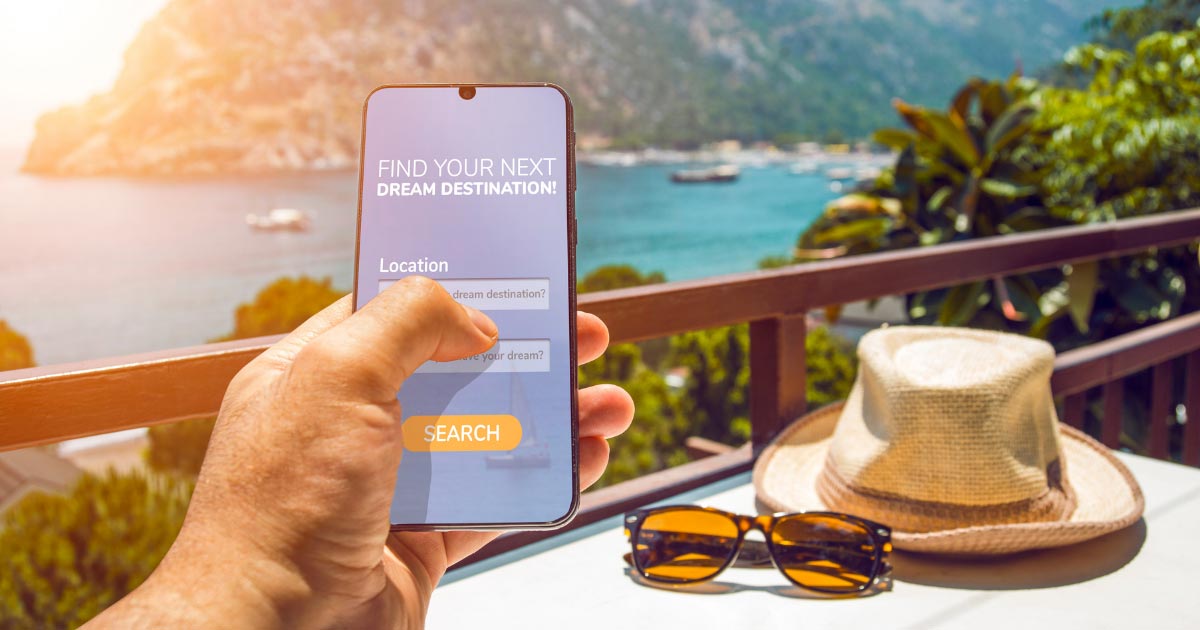
OTAs offer a user-friendly booking process, which is easy to navigate and understand. This is especially important for travelers who may not be familiar with the tour and activity business they want to book with or the destination they are visiting. OTAs provide detailed information about the tours and activities, including pricing, availability, and reviews from other travelers, making it easy for customers to compare and choose what they want.
On a similar note, OTAs allow businesses to use a central platform for booking and managing reservations. This means that businesses do not have to worry about managing bookings through multiple channels, such as phone or email. Instead, all reservations can be managed through a single platform, making it easy to keep track of bookings, manage availability, and update information.
Market your tours through an OTA
OTAs have a large customer base, which means that your tours will be visible to a much broader range of potential customers than if you were to rely solely on your own marketing efforts.
By listing your tours on an OTA travel platform, you can take advantage of the OTA’s marketing and advertising campaigns to promote your tours. This can include targeted emails, social media campaigns, and online advertising, all of which are designed to reach customers who are interested in the types of tours and activities you offer.
In addition, OTAs often have strong search engine optimization (SEO) capabilities, which means that your tours are more likely to appear at the top of search results when customers are searching for tours in your destination. This can help to increase your visibility and attract more customers to your business.
Reduce costs
As well as minimizing your marketing costs, listing your tours on an OTA platform can also help you reduce your distribution costs. OTAs typically charge a commission on each booking, but this cost is often lower than the cost of distributing your tours through other channels, such as travel agents or direct sales. This is because OTAs have already invested in the infrastructure required to market and sell tours, which means that you do not have to bear these costs.
What are the costs of working with an OTA?
Partnering with resellers, including OTAs, can be a cost-effective way for tour and activity businesses to expand their reach and generate more bookings. However, there are certain costs of partnering with resellers , including OTAs . These costs include:
- Commission: OTAs typically charge a commission on each booking, which can range from 10% to 25% of the tour price, depending on the platform and the type of tour. This commission is a cost that businesses need to factor into their pricing strategy and profit margins.
- Listing: While it is usually free to list tours on an OTA platform, some platforms may charge a listing fee or require businesses to pay for premium placement in search results. These costs can add up, particularly for smaller businesses that are trying to manage their marketing budgets.
- Payment processing: Some OTAs offer payment processing services, which means that businesses do not have to manage payments themselves. However, these services often come at a cost, such as a per-transaction fee or a percentage of the transaction value.
- Contractual obligations: When partnering with OTAs, businesses may be subject to certain contractual obligations, such as minimum availability requirements, cancellation policies, and commission rates. Failing to comply with these obligations can result in penalties and additional costs.

Tips for tour operators partnering with an OTA
Before partnering with OTAs, there are a few things you need to be aware of in terms of the information that they will most likely expect you to provide. There is no guarantee that every tour operator will be listed, but if you can provide these things it will go a long way towards improving your chances.
Offer real-time availability to travelers
Online Travel Agents want to offer their customers real-time booking confirmation, this means you need to be able to provide bookable spots for your tours or activity in real-time as well as update your availability in real-time as it changes.
Allow last-minute bookings
Allow last-minute bookings and specify how many hours before the tour starts your customers can book. Of course, you need enough time to prepare your tour before people come, but keep your minimum notice as close to the starting time of your experience as you can. Bearing in mind that a lot of travelers book activities on quite short notice, OTAs want to be able to provide this option for all of their listed activities. As such, it is advisable that you keep your cut-off time as close to the start of the activity as you can.
Leverage tour booking software

Not only technical, but also in the customer experience. For starters, your customer booking software should have a solid API integration with the OTA. You’d want to avoid manual work as much as possible. When sharing your availability with the OTA, you want the booking information pushed into your booking software, so it automatically populates your CRM , sales reports , and manifest . This will avoid lost customers and makes it easy to keep control over your bookings, even when it’s a large volume.
Accept bookings as much as 2 years in advance
Schedule your availability for 2 years and make sure people can book 2 years in advance. It’s good practice to make sure all your availability is published across as many channels as possible, but make sure it’s also available for a long time – the earlier you fill up your tours the better. Online Travel Agents attract a lot of people who are exploring your destination. Travelers want to know what they’ll get to see and do in your destination before they book their hotels and tours. Some travelers take up to 2 years to prepare for their trips, so make sure you always have the availability to attract them to your destination. Of course, as we said, short-term availability is important as well, but it’s best to cater to as wide a range of booking behaviors as possible.
Stand out with beautiful pictures of your destination
A picture speaks a thousand words and makes your product stand out from the rest. Be aware that your product is listed next to your competitors’ and the best picture is likely to receive the booking. Having nice, high-resolution pictures and videos will help you stand out and will always make your listing look professional, no matter where it’s being promoted.
Write unique product descriptions for each OTA
It’s perfectly acceptable to have your product listed on multiple Online Travel Agents. However, you need to have different descriptions for your product on each of them. Spend some time writing a special description for your tour specifically for each OTA’s listing. This is because of curation – OTAs want unique descriptions because they are easier to get to the top of the list of search engine responses. Look at the listings already on each OTA and use this format. Don’t have any weird formatting, inconsistent symbols, special offers, or your email address in the product description when you submit it.
Make the most out of your OTA partnership
Working with OTAs is a good strategy, but can be difficult to manage on an ongoing basis without the right technology to back you. How can you ensure that you don’t overbook tours when selling on multiple channels? How can availability be constantly up to date across your various distribution channels (without doing hours of admin work)?
Rezdy’s Channel Manager softwar e exists to do exactly that. Our Channel Manager lets you update your availability across all your distribution channels from one place. This in combination with the OTAs we integrate with offers you some formidable distribution strategy options.
Start accepting online bookings with Rezdy. Start your FREE 21-day trial or book a demo with our team of experts today.
If you enjoyed this article, be sure to subscribe to the Rezdy newsletter , where you’ll receive weekly up-to-date learnings and news from the Experiences industry; straight into your inbox.
Want to take your distribution strategy to greater heights?

Start accepting online bookings with Rezdy
Enjoy 21 days to take a look around and see if we are a good fit for your business.
No obligations, no catches, no limits, nada

The benefits of becoming a GetYourGuide supplier

How much does it actually cost to partner with an OTA?

Why Should Tour Operators List Their Products with OTAs?
- Property Management System
- Channel Manager
- Booking Engine
- Marketplace
- Revenue Management
- Cloudbeds Payments
- Cloudbeds Amplify
- Whistle for Cloudbeds
- B&Bs and Inns
- Hotel Groups
- Vacation Rentals
- Channel Connections
- Ambassador Partner Program
- Cloudbeds Horizon
- Become a Partner
- Customer Stories
- Resource Center
- Guides & Reports
- Calculators
- What to Expect
- Customer Success
- Knowledge Base
- Compass What's new in Q2
- Cloudbeds University
- Government Compliance
- Company News
- Meet the Team
- Careers We're Hiring!
- Become an Ambassador
- Event Schedule

What are online travel agencies? The ultimate guide to OTAs
Love them or not, online travel agencies (OTAs) play a critical role in every property’s distribution strategy. According to Expedia Group’s 2023 Path to Purchase report, OTAs captured 51% of online hotel & lodging bookings and possess the visibility and marketing power that most individual properties cannot achieve on their own.
Working with OTAs isn’t just a matter of signing up and hoping for the best. To take advantage of the opportunities and avoid the pitfalls, you need to actively manage your listings, pricing, and inventory and take a strategic approach to online distribution.
If done correctly, adopting the right OTAs as part of your distribution strategy can actually help drive direct bookings through the “billboard effect.” Building a comprehensive channel mix incorporating different types of OTAs will ensure you reach your target audience and secure a steady stream of reservations.
See which OTAs dominate globally, regionally, and across property types based on Cloudbeds customer data and how properties like yours use OTAs as part of their distribution strategy.
At Cloudbeds, we know the world of OTAs and distribution channels can be complex. We’ve created the Big Book of OTAs to help demystify this process and explain how to create a recipe for success when working with third-party distribution channels.
What is an online travel agency (OTA)?
An online travel agency (OTA) is a website that acts as a search engine for travel. They connect providers across the travel industry to help travelers easily plan their trips. On OTA sites, travelers can often access package deals with accommodations, airfare, cruises, rental cars, and more.
On average, travelers view 141 pages of travel content in the 45 days before booking a trip, with OTAs making up 67 of those pages. Therefore, properties must be active on as many channels as possible to increase brand awareness and drive bookings — both OTA bookings and direct bookings (more on this later). With the increased popularity of OTAs around the world, hoteliers now have access to markets once unattainable.
How do OTAs work?
Online travel agencies emerged in the 1990s, using the internet’s extensive reach to aggregate global travel supply into a single place so consumers could book their own travel online. These self-service tools reshaped the hotel industry and booking experience with functionality that allowed the general public to easily plan their trips and reserve their airfare, accommodations, vacation packages, car rentals, and tours on their own rather than rely on a physical travel agent.
Sites such as Expedia.com, Booking.com, Airbnb, Orbitz, Hotels.com, and TripAdvisor are often consumers’ first stop when researching and booking their next trip. These apps offer a seamless user experience at all stages of the buying process: problem/need recognition, information search, evaluation of alternatives, purchase decision, and post-purchase behavior.
Properties of all types and sizes can connect to multiple OTAs through an integrated channel manager . A distribution system, like a channel manager, shares room inventory and rates from your property management system (PMS) to your booking engine and OTAs. Properties that use a channel manager can streamline hotel operations, increase hotel revenue via revenue management best practices , and increase occupancy across channels (all without the fear of overbookings).
OTA business models
Hotels form partnerships with OTAs by basically outsourcing marketing to OTAs, who then make money through two business models: the merchant model (guest pays the OTA in advance) and the commission model (guest pays the hotel at check-in or check-out). Most OTAs offer a blended model so that hotels can let guests choose which option they’d prefer.
The merchant model
In this model, the online travel agency acts as the merchant of record and collects payments from guests at the time of booking. Once the guest has checked out, the OTA pays the hotel. Contracts exist between hotels and OTAs to provide a set number of rooms to the OTA at a favorable rate. The OTA then makes a profit off each room sold but must meet its contractual thresholds.
The agency (commission) model
In this model, the consumer books via the OTA but pays the hotel directly at the time of checkout. The hotel then pays the OTA a commission on the total value of the booking after checkout. There are no contracts, and rates are set by hotel management.
The advertising model
This model has increased in popularity and exists on metasearch sites such as Google Hotel Ads, Tripadvisor, Trivago, and KAYAK. Metasearch engines work primarily on a cost-per-click basis where hotels can promote their rooms with links to their direct booking engine, and pay a fee based on the number of clicks they receive. Some of these sites, such as Google, also offer a cost-per-acquisition model (also known as “pay per stay”) where the property pays a percentage of the total reservation cost upon completion of the stay.
For hotels, it can be frustrating to watch distribution costs rise without getting more in return, but there are costs associated with direct bookings too. Demand doesn’t appear without at least some sort of distribution or marketing strategy in place, and those marketing campaigns, loyalty offers, special deals, and direct booking tools have a cost to the hotel. That’s why it’s important to use OTAs wisely and in conjunction with your own direct marketing strategy.
Online travel agencies vs. online travel agents
Before the rise of OTAs, it was the role of a travel agent to book leisure and business travel. This is because travelers back then did not have access to hotel availability and rates the way we do today. While the internet has made it easier for travelers to book their own trips online, some segments like luxury, corporate, and group travelers still prefer to utilize a person, or online travel agent, to help plan and book a trip.
Travel agents are beneficial when planning complex trips such as a destination wedding, honeymoon, or corporate trip. They have the expertise and connections to find unique accommodations at better rates than most people can find themselves.
Travel agents such as Kuoni have a team of destination experts who work behind the scenes to curate tailor-made accommodations, experiences, and itineraries. Their in-person stores allow travelers to enjoy a glass of champagne while meeting with a travel expert to plan their dream vacation.
Travel agents usually have a portfolio of properties they recommend to travelers and take a commission fee, similar to OTAs. Strong relationships with travel agents can help properties drive more bookings in alternative segments than the OTA market.
Difference between OTAs and metasearch
With so many online booking channels available today, it can be challenging to understand the difference between certain channels.
Metasearch websites like Skyscanner act as aggregators and display hotel information and room rates from a variety of online channels, including OTAs like Agoda, Trip.com, Travelocity, or Priceline.com and a hotel’s website. It enables travelers to compare all of their hotel booking options in real time across the web so that they can book the best deal.
OTAs provide room rates and booking capabilities for only one channel — their own. Meanwhile, metasearch sites can display up to twenty or more results.
Properties can invest in hotel marketing efforts through metasearch engines. Metasearch sites rank listings and it pays off to be near the top. Paying to have your listing higher in the ranks to drive more direct bookings can drive serious results.
Is Google an OTA?
Google is often a traveler’s first stop when looking for a hotel room. In recent years, Google has changed the hospitality industry with its products. Google offers Google Hotel Search, which acts as a hotel metasearch platform. When a traveler enters a property’s name into Google, it will show all of the rates and listing information from across the web.
Google also has free booking links , a game-changer for independent hotels as they can list their direct rates and links to their own website within the Google Hotel Search box. This option encourages potential guests to book direct.
The Big Book of OTAs
- First name *
- Last name *
- Property Name *
- Property Type * Property type* Hotel Bed and Breakfast Hostel Apartment Groups Vacation Homes Alternative Accommodations
- How many listings do you have?
- How many Addresses does your business have?
- Language for your demo * English
- Increase revenue
- Delight guests
- Streamline operations
- Property Name
- Property Type Property type* Hotel Bed and Breakfast Hostel Apartment Groups Vacation Homes Alternative Accommodations
- Postal Code
- Language for your demo English Spanish Portuguese Franch Vietnamese Japanese Thai Italian
- Cloudbeds Hospitality Platform
- Cloudbeds Websites
- Ambassador Program
- Product Updates
- Cloudbeds Login
- Terms of Service
- Privacy Policy
- Data Security
- Cookie Policy
- Accessibility

What is an OTA? Online Travel Agency Defined

In the ever-expanding realm of hospitality, the term ‘OTA’ is frequently tossed around. But what exactly does it mean, and why is it crucial for your vacation rental business?
Today, we’re demystifying the enigma of OTAs.
What is an OTA (Online Travel Agency)?
OTA stands for Online Travel Agency. These digital platforms, like Airbnb , Vrbo and Booking.com , act as intermediaries between hosts like you and travelers seeking accommodation.
Think of them as online marketplaces or booking platforms that connect your beautiful vacation rental property with a global , local or niche audience of potential guests.
Why OTAs Matter for Vacation Rental Hosts
OTAs play a pivotal role in the success of vacation rental businesses. They offer unparalleled visibility, putting your property in front of millions of travelers actively searching for unique and comfortable stays.
By listing your property on these platforms, you tap into a vast reservoir of potential guests, boosting your occupancy and revenue .
Benefits of Using OTAs
1. global exposure.
OTAs provide a worldwide platform, enabling your property to be discovered by a variety of traveler segments from every corner of the globe. This exposure can significantly boost your bookings .
2. Streamlined bookings for guests
OTAs offer user-friendly interfaces that simplify the booking process for guests. Travelers can easily view your property, check availability, assess your level of service, and secure their stay, enhancing their overall booking experience .
3. Credibility and trust
Being listed on reputable OTAs lends credibility to your vacation rental. Travelers often trust these platforms due to their – real or assumed — verification processes , leading to increased confidence in booking your property.
4. Payment security
Most OTAs handle payment transactions , ensuring a secure payment process for guests. This eliminates guest concerns about payment fraud and provides confidence to book.

How OTAs Make Money
OTAs operate on various business models, generally catering to both hosts and travelers.
Commission model
The most common approach, the commission-based model is where hosts list for free but pay a percentage of their booking amount to the OTA as a commission for every successful reservation. This incentivizes OTAs to promote your property as their earnings are directly linked to your bookings.
Many of the OTAs that use this approach also charge a commission from guests.
This is the model used by Airbnb, Vrbo, Booking.com, Expedia , etc.
Subscription model
In this model, the OTA charges hosts a fixed amount to list their properties on the platform, regardless of the number of bookings. This model is used by platforms such as Furnished Finder .
The platforms may or may not charge guests a booking fee.
Hybrid model
Some OTAs offer a hybrid model, combining aspects of both commission and subscription fees.
A few OTAs have their own distinctive model. For example, Hopper doesn’t charge hosts or guests a commission. Instead, it adds a dynamic markup to the rate provided by each property. Got2Go doesn't charge hosts either while guests pay a service fee per booking or an annual subscription.
Maximizing Your OTA Experience
To make the most of OTAs, optimize your property listings .
High-quality photos , detailed descriptions and competitive pricing can significantly enhance your visibility and attract more bookings . Moreover, prompt responses to guest inquiries and positive guest reviews can bolster your property's reputation and search rankings , leading to higher conversion .
Make sure you’re taking into account each platform’s unique requirements and preferences and optimize each listing accordingly.
OTAs vs Metasearch Engines
OTAs and metasearch engines serve distinct purposes in the online travel industry.
OTAs, as mentioned earlier, are platforms where hosts list their properties, and travelers can directly book accommodations. These platforms facilitate the entire booking process, including payment transactions and communication between hosts and guests .
Metasearch engines, like Google Travel and TripAdvisor , aggregate information from various OTAs and other sources, allowing travelers to compare prices and availability across different platforms. Metasearch engines redirect users to the respective OTA listings or direct booking websites to complete their reservations.
While both OTAs and metasearch engines contribute to a property's online visibility, OTAs offer a platform for booking directly while metasearch engines redirect to an OTA or direct booking listing.
Key Takeaway
Embracing OTAs is not a choice for most vacation rental property managers and hosts — it’s a necessity. By leveraging these platforms wisely and effectively, you open the door to a world of opportunities for your vacation rental business.
Ready to find out how Hostaway can transform your business?
Launched in 2015, Hostaway has helped thousands of vacation rental property managers regain their focus on growing their business. Hostaway takes pride in aligning itself with the needs of the fast evolving landscape and always provide reliable technology and great support. Sign up today!
Don't get stuck in a broken routine with poor software, manage your properties with Hostaway and experience a better business and life right away!
ColorWhistle
Digital Web Design Agency India

Explore our Market-Fit Services
We ensure to establish websites with the latest trends as we believe that, products whose value satisfies the needs of the market and its potential customers can be efficiently successful.
Quick Links
- About Us – ColorWhistle
- Engagement Models
- Testimonials
- Case Studies
- Agency Services
- Web Development
- Web App Development
- Digital Marketing
- Travel Website Development Services Company
- Real Estate Website Development Services Company
- Education Website Development Services Company
- Healthcare Website Development Services Company
- Hotel and Restaurant Website Development Services
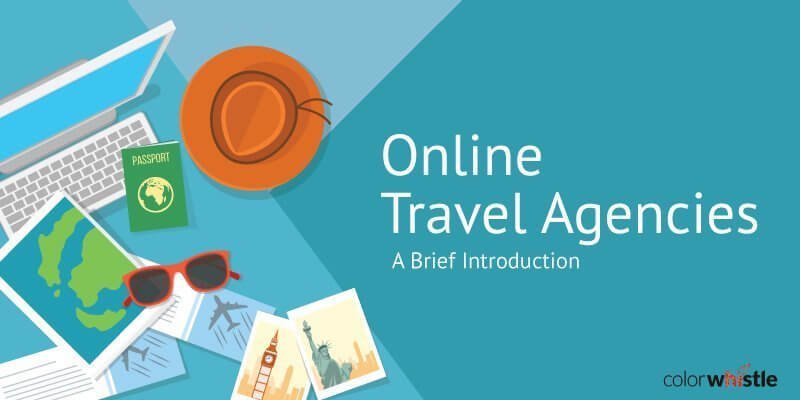
Category: Travel
Date: May 31, 2024
Online Travel Agencies – A Brief Introduction
The role of an online travel agency (OTA) is becoming increasingly important in the accommodation industry as they provide a convenient way for travelers to arrange their stay. From the comfort of their home, travelers can compare hotel prices and book them over the internet.
In this blog, we are going to discuss what an OTA is, the best OTA platforms, travel website development and how to do it right, and more.
Ready? Let’s go.
What Are Online Travel Agencies?
An online travel agency (OTA) arranges and sells accommodations, tours, transportation and trips on an online platform for travelers. They are third parties who sell services on behalf of other companies.
Usually, these OTAs offer many benefits with added convenience with more of a self-service approach. They also include a built-in booking system which allows instant bookings.
How Do Online Travel Agencies Work?
OTAs generally work on two models. They are,
1. Merchant Model
In this model, hotels sell rooms to OTAs at a discounted or wholesale price. Then, the OTA sells them to the customer at a markup price
2. Agency Model
This is a commission-based model where OTAs acts as a distribution partner. OTAs receive full commission after the stay has taken place. The hotel directly receives the payment from the end customer and does not wait for the payment transfer from third-party distributors.
What Are the Benefits of Partnering with Online Travel Agencies?
In one word – exposure! Online travel agents get thousands of website visitors from all over the world. Plus, they have positioned themselves as an authority on everything related to travel. So, people trust the recommendation they receive from OTAs.
By listing in OTAs, accommodation businesses like hotels not only reach a vast set of audience but will also find their service among many other reputable sources of information.
In addition, hotels that are listed on OTAs can also benefit from what is referred to as the ‘billboard effect’. This means that OTAs provide a form of advertising for service providers such as hotels on their platforms. Once the user gains this awareness, they may even go to the website of that particular hotel to make a direct booking.
What Are the Advantages and Disadvantages of Selling Through Online Travel Agents?
Accommodation businesses like hotels and B&Bs have pros and cons of getting listed in OTAs. Let’s take a look at them.
Advantages Of Online Travel Agents
- Low-cost method of selling accommodation services
- Reduced online marketing spend as OTAs invest in advertising to attract potential customers
- Impartial reviews give customers the confidence to book
- Users can easily compare various accommodation costs at one place
Disadvantages Of Online Travel Agents
- Commission rates are charged on every sale. It can range between 10-15% of the gross cost
- Restrictive cancellation terms
- Even if accommodation businesses use OTAs, the need for their own website and booking engine does not go away
- Investment in a balanced multi-channel strategy may be needed to boost sales
Even though OTAs can help to fill your rooms, accommodation businesses must try to maximize revenue through their own website. Consistent work on search engine optimization tactics and other digital marketing techniques is a must. Accommodation businesses must focus on customer retention techniques and directly target their existing customers through emails and direct marketing.
How To Start An Online Travel Agency?
Travel agencies no longer inform customers about the availability of flights and rooms. They issue rooms and get a commission from the respective accommodation businesses. That is why most of the new travel businesses follow the OTA model.
If you plan to enter the OTA arena, you can specialize in pilgrimages, leisure travel, business travel or any niche. But, focusing on how effectively you offer things is the key to success.
Here Are Some Points You Have To Consider When Starting An Online Travel Agency.
- Register the name of your agency and if applicable, take a license as per your local laws
- Try to get a membership in IATA or any other reputed travel organization
- Gain more knowledge about the travel industry and particularly the nice you want to concentrate
- Get your travel website designed by a professional company like ColorWhistle
- Offer deals that focus on a specific geography. Focusing on a particular niche will also bring more success
- Publicize your business in the online space
- Utilize the power of blogging
- Create a good social media presence
Why Do People Use Online Travel Agencies?
here are some of the main reasons they prefer ota’s..
- Few OTAs offer reward programs which can be used for future travel needs
- Special rates which cannot be found elsewhere
- Some OTAs may have generous cancellation policies. For example, Priceline does not offer any penalty if the user cancels the ticket until the end of the next business day
- Most users may not have an idea on where to book other than an OTA
- OTAs make it easy to compare different rates
Which Are the Best OTA Platforms?
1. booking.com.
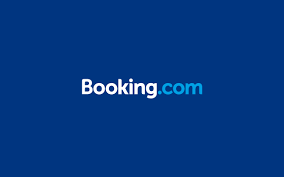
Booking.com is one of the largest accommodations websites which has now expanded to smaller markets such as family-operated bed and breakfast, vacation rentals and self-catering apartments.
Interesting statistics
- Every day, 1,550,000 nights are booked
- 68% of nights booked came from families and couples
- 42% of nights booked came from unique places such as homes and apartments
- 38% of reviews are given by guests which are useful for other travelers
- 75% of nights booked come from guests who booked more than 5 times
2. Expedia’s Hotels.com
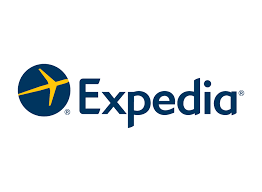
Expedia’s Hotels.com is a popular brand which has a global audience and attracts diverse travelers. The company gained more power in the industry by acquiring Travelocity.
- Gets over 675 million monthly site visits
- Operates in 70+ countries and 40+ languages
- Attracts 75 million monthly flight shoppers
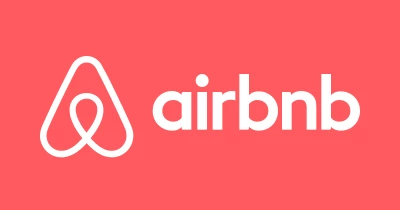
Airbnb revolutionized the travel accommodation industry by introducing home-sharing. The website has diverse listings and travelers get a sense of safety as they can know their guest’s identity.
- 2.9 million hosts are present on Airbnb
- Average of 800k stays each night
- 14k new hosts join every month
Apart from these major OTAs, there are many small ones such as OneTravel, Vayama, Tripsta, TravelMerry, ExploreTrip, Kiss&Fly, Webjet, GoToGate, Travelgenio, Bookairfare, Fareboom, Skybooker, Travel2be, OneTwoTrip!, and eBookers.
Drive Conversions and Boost your Business with Expert Travel Website Development.
What the future holds for online travel agencies.
It is clear that, in the near future, accommodation businesses are not about to back down from OTAs. They are enjoying the billboard effect and trying their best to retain website visitors and convert them into direct booking.
Sure, there is a cost involved. The upside of this is that accommodation businesses are working hard to create a loyal customer base that will continue to seek direct bookings.
The chances of OTAs suffering in the long run are pretty slim. Smaller accommodation businesses have a lot to gain from the exposure they receive through OTAs. Plus, a large portion of the younger generation prefers OTAs. So their market will continue to grow.
If you need any help to design, develop or market an OTA website, contact our travel web design and development experts at ColorWhistle .
We can create an amazing website with beautiful designs combined with dynamic content such as live rates and special offers. Contact us today for your free business analysis and consultation.
In quest of the Perfect Travel Tech Solutions Buddy?
Be unrestricted to click the other trendy writes under this title that suits your needs the best!
- Travel Meta Search Engine
- GDS Travel Agency Guide
- GDS OTA Travel Meta Searchengines
- Travel Aggregator Website
- Best Travel Websites Inspiration
- Travel Website Features
- Top WordPress Travel Website Themes
Related Posts
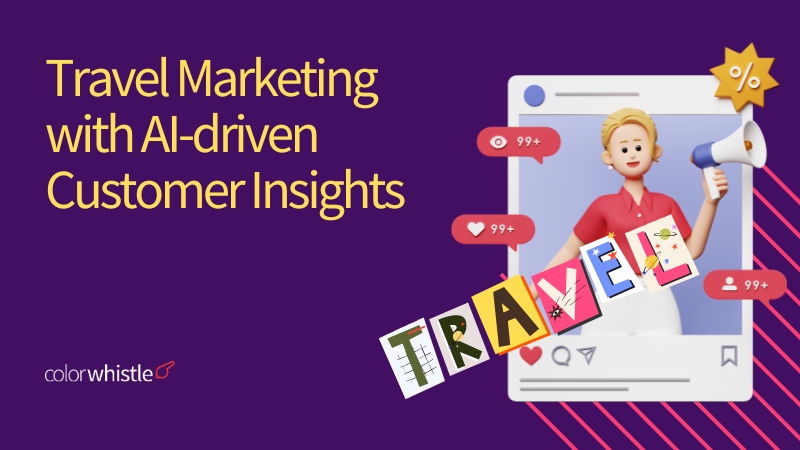
Enhancing Travel Marketing with AI-driven Customer Insights
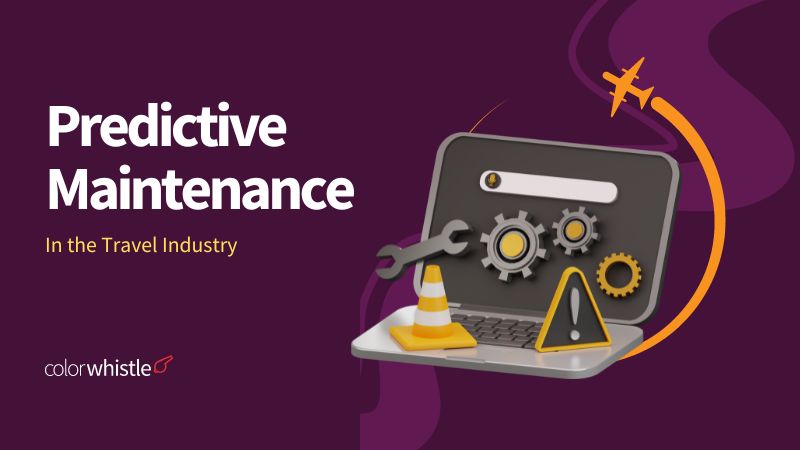
How Predictive Maintenance Can Help the Travel Industry
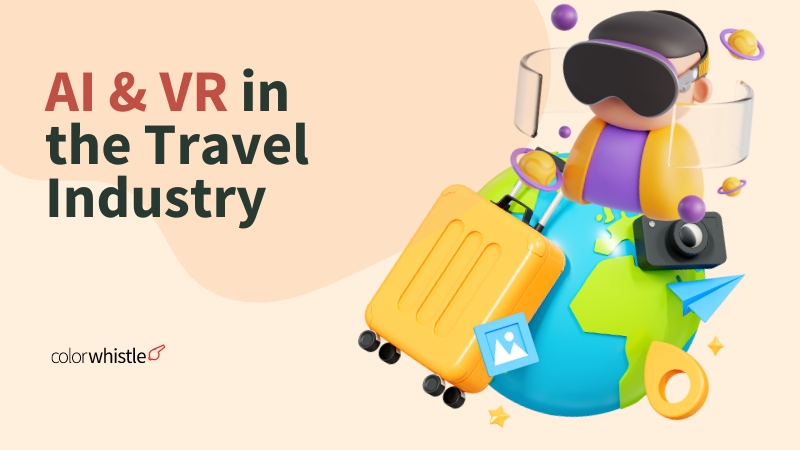
Exploring the World Through AI and VR in the Travel Industry
About the Author - Anjana
Anjana is a full-time Copywriter at ColorWhistle managing content-related projects. She writes about website technologies, digital marketing, and industries such as travel. Plus, she has an unhealthy addiction towards online marketing, watching crime shows, and chocolates.
View Our Services
Have an idea? Request a quote
Share This Blog
its a good website i love it
i think it is a great website i love it so much but i need more information about what am looking for. thanks
It is a good website and I need more information for learning
I learned a lot through this web.
Leave a Reply Cancel reply
Your email address will not be published. Required fields are marked *
Ready to get started?
Let’s craft your next digital story

Sure thing, leave us your details and one of our representatives will be happy to call you back!
Eg: John Doe
Eg: United States
Eg: [email protected]
More the details, speeder the process :)
Discussion Schedule: Ready for a GMeet Call Discussion Today / Tomorrow Available on a Phone Call Discussion Today / Tomorrow Send me a Calendar to Book The Meeting
Effortless booking
Maximize online conversions with the most intuitive checkout online.
Expand revenue with our powerful Automated E-commerce tools.
Upgrade your website to industry’s best. Fresh websites. Fresh revenue.
Amplify visibility and expand earnings with integrated OTAs and local partners.
Streamline check-ins, limit risk, and amplify customer data with built-in digital waivers.
Transform data into insights. X-ray reporting gives you customer and business intelligence.
Manage high-volume walk-up customers effortlessly with POS, ticketing, and gated entry.
Automate management of staff schedules, assignments, and staff communications
Control your business precisely the way you want with endless yet easy configurability.
Allocate equipment used in various products. Prevent overbookings and maximize profits.
Grow with Xola in our constantly expanding universe of integrations and apps.
Harness customer data to drive marketing campaigns and generate repeat business.
Transform your guests into passionate brand advocates. Perfect your products & services.
Manage your business with the most powerful mobile suite in the industry.
Perfect the guest experience by giving your staff the industry’s most intuitive software.
Efficiently manage guest flow, minimize wait times, and ensure maximum satisfaction.
Ticketing & Entry
Revolutionize your guest experience: Effortless check-ins, interactive displays, secure payments.
Boost revenue with automated rave reviews, actionable insights, and loyal customer engagement.
Efficient ticketing, digital waivers, and fast check-ins enhance on-site operations and guest satisfaction.
Explore Xola Universe: 80+ apps, limitless integrations, endless growth opportunities.
Simplify check-in and boost your marketing efforts with our integrated automated digital waivers.
With SOC 2 Type II and CCPA compliance Xola exceeds industry security standards and insures your data protection.
Access real-time insights for business growth with our powerful reporting.
Remarkable and hassle-free guest experiences with waitlist and virtual queuing.

AI dynamic pricing use cases for tours and attractions
- Xola University
- Business Operations
A complete guide to all the OTAs

Online Travel Agencies (OTA) are a key component for tour and attraction operators — but with so many of them available, how do you know which one to choose?
Even as travel suppliers start to move away from OTAs to focus on direct bookings, these massive online marketplaces can still help your company reach tons of new customers. This is particularly true for newer tour businesses.
In this post, we’ll explain exactly what is an Online Travel Agency and which ones your company might consider joining.
- What are online travel agencies?

What’s the difference between offline and online travel agencies?
- Is it worth it to list your tours and experiences on OTAs?
Top 22 OTAs
1. getyourguide, 2. touriosity, 5. musement, 6. expedia local expert, 7. airbnb experiences, 8. google things to do, 9. tourradar, 10. travelzoo, 11. thrillophilia, 13. booking.com, 15. trip.com, 16. hostelworld, 17. edreams, 18. despegar, 19. tripways, 21. tripshock, 22. adrenaline, what are online travel agencies .
Online Travel Agencies (OTAs) are online marketplaces where travelers can research and book their trips. These marketplaces are a key distribution channel for tour and attraction operators because they help expose their products to a wide network of internet browsers.
There are over 400 OTAs today, including all global OTAs, metasearch engines, hostel websites, vacation home rentals, and tour and activity resellers. This includes companies like Expedia, Priceline, and Booking.com that sell everything from flights and hotel stays to local tours and attraction tickets online.
These platforms are very common within the hotel industry; potential guests will often check OTA websites to find the best deal before booking directly with the hotel. Yet many of them also have a robust tours and activities section, where travelers can sift through hundreds of options from different companies in the cities they’re visiting.
That being said, OTAs have become the most preferred medium for travel bookings in the world. It’s never been easier for travelers to find things to do in a destination, read reviews, and compare prices. Research shows that price is, in fact, one of the biggest motivators. Notably, 45% of U.S. travelers who purchased an attraction ticket through an OTA did so because they thought that the platform offered the best ticket price available.
In the tours and activities space, the most well-known OTAs are Viator, Expedia, Google Things to Do, GetYourGuide, and Airbnb Experiences. Tour companies and attractions often list their offerings with one of these OTAs to increase their exposure and bring in more bookings.
Meanwhile, the hospitality industry — as well as smaller travel brands like tours and attractions — are investing in marketing campaigns to drive more direct bookings. While listing your experiences is free, you’ll pay a commission fee for every booking made through the platform.
How do OTAs work?
There are dozens of different OTAs , from niche platforms like Adrenaline — which caters to adventure travel activities — to massive agencies like Expedia.
The first step is to choose the one that best fits your company’s needs.
Then, you’ll need to go through an application process to become a supplier of that OTA. Signing up is typically free. The process consists of an online questionnaire where you’ll describe your tour offerings and prices. You’ll also upload photos to visually showcase your experience and come up with a catchy title and description for your experience(s).
Then, a representative should reach out to negotiate commission fees, unless a standard fee is already in place.
Your tours or attraction will then be listed on the platform. Every time a guest searches for a related activity on the platform, your company will be among the search results.
Every OTA has a search algorithm that determines where your listings will appear in search results. It’s up to you to familiarize yourself with that algorithm and make the necessary improvements to your listing so that it reaches more people.
Once your listing is up, guests can book experiences or purchase tickets through the platform. Here’s the catch: You’ll need to pay the OTA a commission fee for every booking.
Offline travel agencies were the go-to source for travel booking two to three decades ago. These agencies often had brick-and-mortar locations helmed by physical travel agents.
These agents would book hotels, flights, and more on behalf of the traveler.
Most travel agents had years of experience and many brand partners in the travel industry. This allowed them to find and negotiate the best possible deals for their customers. Many times, travel agents could put together trip packages that included accommodation, transportation, and activities for a discounted rate.
At a time when online booking wasn’t available, travelers would turn to these agents to do the work for them.
Offline travel agencies still exist today, though they’re now focused more on luxury trips or special itineraries like honeymoons.
Most modern-day travelers have taken a do-it-yourself approach to travel planning. They prefer to book their trips themselves usually with the help of OTAs, where they can browse through hotel, flight, and activity deals themselves.
Is it worth it to list your tours and experiences on OTAs?
There debate between direct bookings vs. OTA bookings will always exist. There’s no denying that your brand can increase its visibility by working with an OTA, but it’ll come at a cost.
For example, if you list your experience on an OTA like Viator — which is part of the Tripadvisor distribution network that receives over 455 million monthly visitors — your tours will likely reach a lot of travelers.
OTAs have massive marketing budgets to bring in as many eyes to their listings as possible. Since they only make a commission on actual purchases, it’s in their best interest to drive as many bookings as possible.
They market their tours on an international scale and many translate their listings into several languages.
Yet the number of travelers that actually see your tours or attractions depends on your ranking within the platform. Every OTA uses an algorithm to rank tour and activity listings in search results. As a supplier, you need to familiarize yourself with that algorithm so that you know how to improve your ranking.
OTAs can also help you collect customer reviews. These agencies know that travelers are drawn to their platforms to compare activity options, and reviews / social proof play a big role in that. There are often tools that encourage guests to leave reviews after their experience.
How do OTA commission rates work?
Relying on OTAs does come at a cost. Most OTAs make money off of each completed booking, including every flight, hotel room, rental car, tour, or event ticket purchased through the website.
Average commission rates range from 20% to 25% — but can be even higher on some platforms. You’ll likely have a chance to negotiate a rate with the platform before signing up.
Many of these platforms also insist that you list your tours for the same price or lower than what’s listed on your website. This is because they don’t want your website to compete with their platform by offering a discounted rate.
While OTAs can help you reach more people, you shouldn’t rely on them for 100% of your online bookings.
How will ChatGPT impact OTAs?
The travel industry is carefully paying attention to ChatGPT, a free artificial intelligence chatbot that can perform an outstanding number of tasks, like holding human-like conversations, writing code, and — most notably – planning trip itineraries.
There’s no denying that the chatbot can assist travelers with itinerary planning. One travel writer already tested it for a familymoon trip to Denmark.
Meanwhile, large OTAs like Expedia and Booking.com have leveraged AI technology to streamline their online booking services for some time now. Expedia’s chatbots, for example, have supported 29 million virtual conversations in recent years, saving over 8 million hours of agent time. And they plan to use ChatGPT to get further ahead in the online booking space.
Now, Expedia hopes to tap into ChatGPT’s advanced technology to help travelers narrow down their hotel search. The company has created a plugin that can research travel costs and suggest resorts and local activities based on traveler preferences.
Meanwhile, Hopper, a platform for finding cheap flights, aims to use the chatbot for concierge-like services, hoping to further personalize the customer booking experience.
Many travel companies see OTAs as a necessary component of their digital marketing, distribution strategy, and overall business model.
Yet there are hundreds of small OTAs that cater to specific regions, travel niches, and activity types. There’s a total of 10 companies that dominate most of the market. The top two — Expedia Group and Booking Holdings — control the largest portion.
If you’re not sure which OTA to work with, here’s a list of the top 22 OTAs on the travel market.
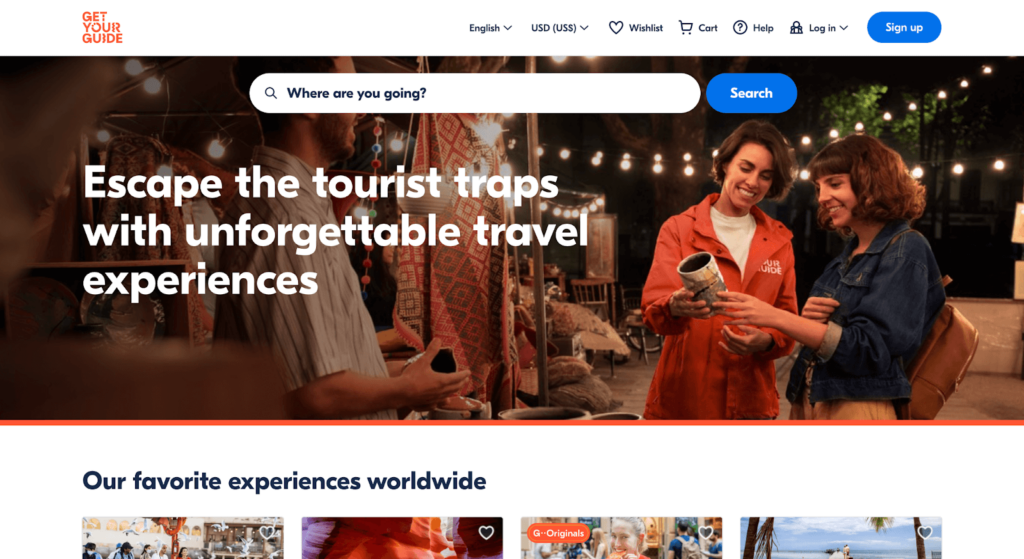
GetYourGuide launched in 2009 as an OTA specializing in travel activities and experiences. The platform sells tours, attraction tickets, city cards, cooking classes, transfers, multi-day tours, and special travel items like Wi-Fi sticks or experiences like wearing traditional costumes. The platform today has over 60,000 bookable activities.
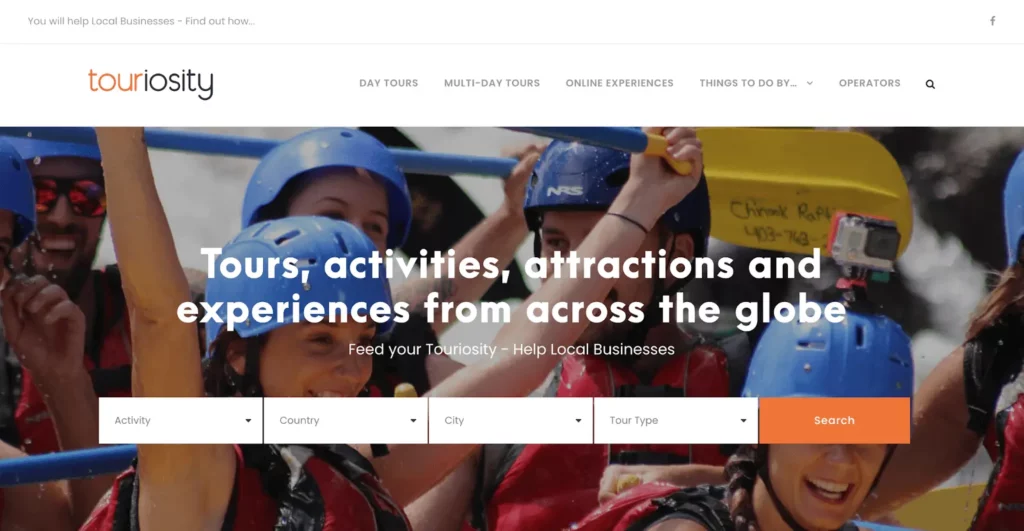
Touriosity is a Scottish nonprofit that takes zero commission from suppliers. Instead, it charges an upfront fee to list your offerings on the platform. The idea is to help suppliers grow their direct bookings while complimenting their own digital marketing efforts, according to the platform. To join, tour and attraction operators who want to join the project must have their business rated at least 4 stars on TripAdvisor, Google, and Facebook, and also register on the website.
Tripadvisor purchased Viator in 2014 to offer its users an easy way to book tours and activities. Today, Viator is one of the leading OTAs in the tours and attractions space, with more than 140,000 bookable activities. The website receives over 450 million unique monthly visitors through Tripadvisor’s expansive distribution network.
Klook is a travel experience booking platform based in Hong Kong. The website and app are popular with solo and independent travelers making their way through Mainland China, Hong Kong, Taiwan, Korea, and Southeast Asia. The OTA now has a growing audience in parts of Europe and the U.S., too.
Musement allows travelers to book local tours and attractions, including temporary, exclusive, hidden gem, and free activities. The company was founded in Milan in 2013 and has since expanded to 1,000 destinations in 80 countries.
Expedia is mostly known as a booking engine for hotels and flights, but it also sells tours and activities. The Expedia website has a “things to do” section where travelers can discover local experiences at their destination of choice. The Expedia Group owns several OTAs, including Expedia.com, Vrbo, Hotels.com, Hotwire.com, Orbitz, Travelocity, Trivago, and CarRentals.com.
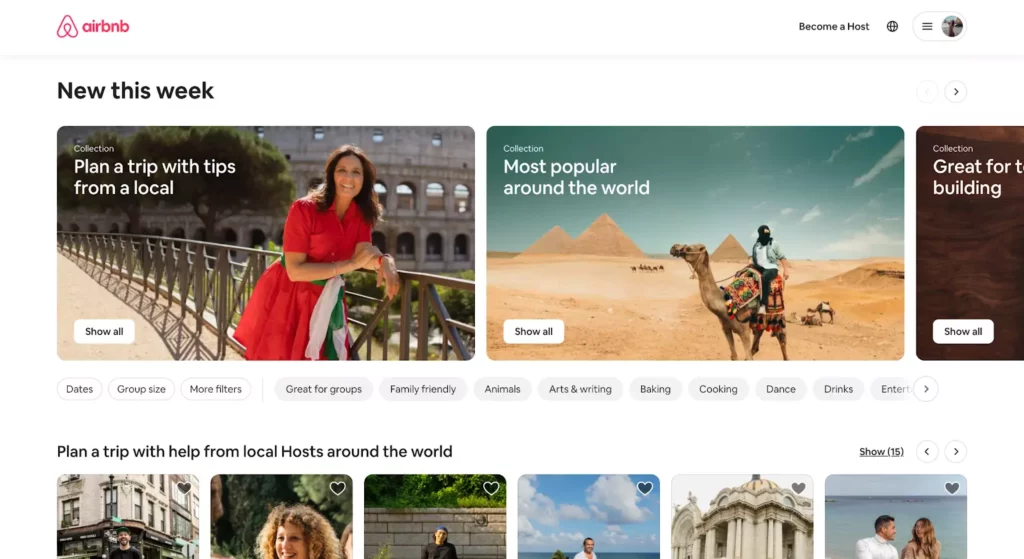
Airbnb is the leading marketplace for home-sharing and vacation rentals. The Airbnb website welcomes over 75 million website visitors every month. Many of these travelers are booking not only stays but also experiences. In 2016, Airbnb jumped into the tours and activities market with its signature tour brand called “Airbnb Experiences,” which included immersive tours and activities led by local hosts. The company also launched a slew of virtual experiences in response to the pandemic in 2020.
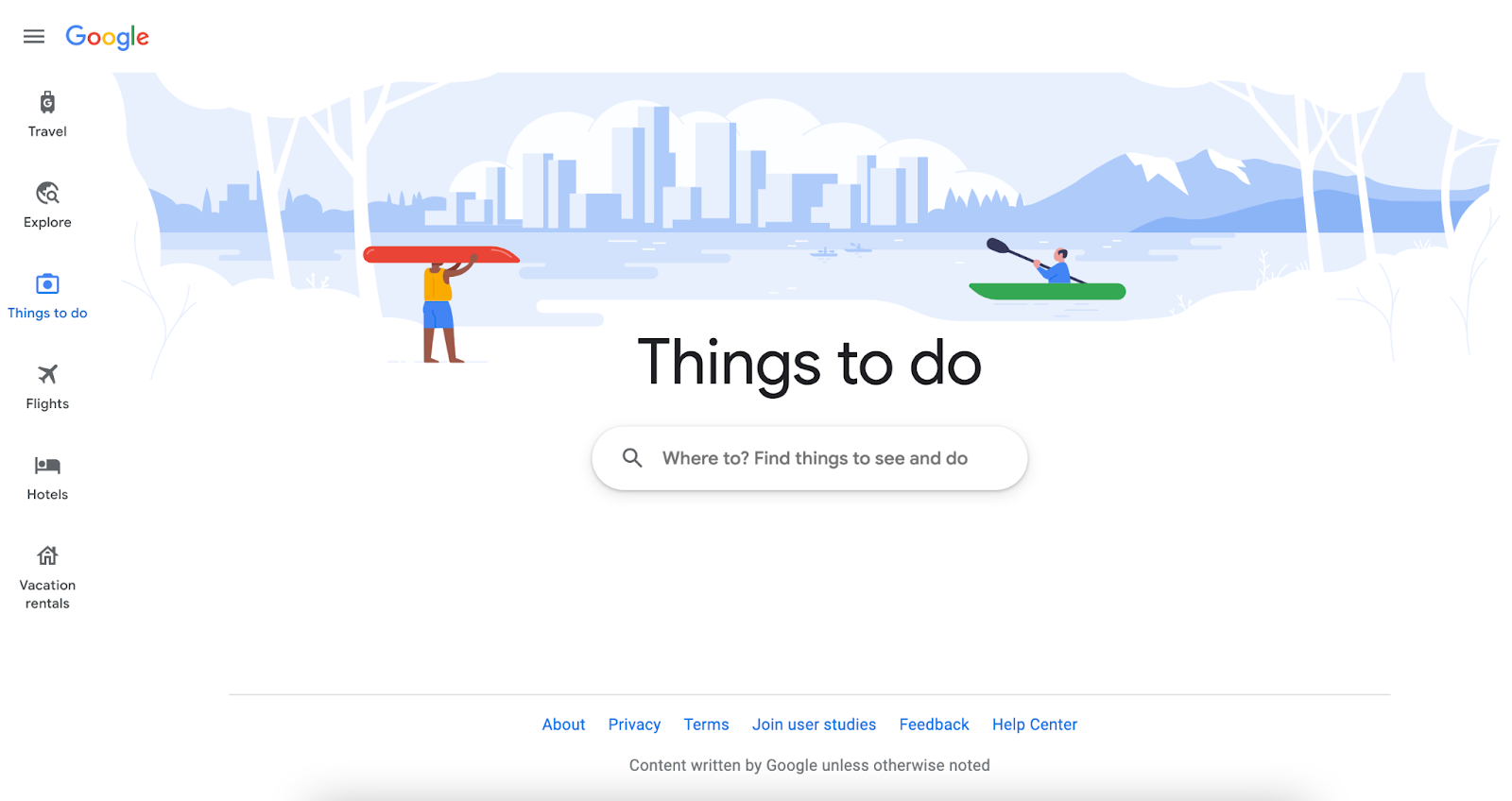
Google Things to do is a search experience that connects travelers to attractions, tours, and activities through their Google searches. When users search for a specific attraction, point of interest, or activity, they’ll be shown general information as well as booking links. They can book directly on the operator’s website or the various OTAs that sell the experience.
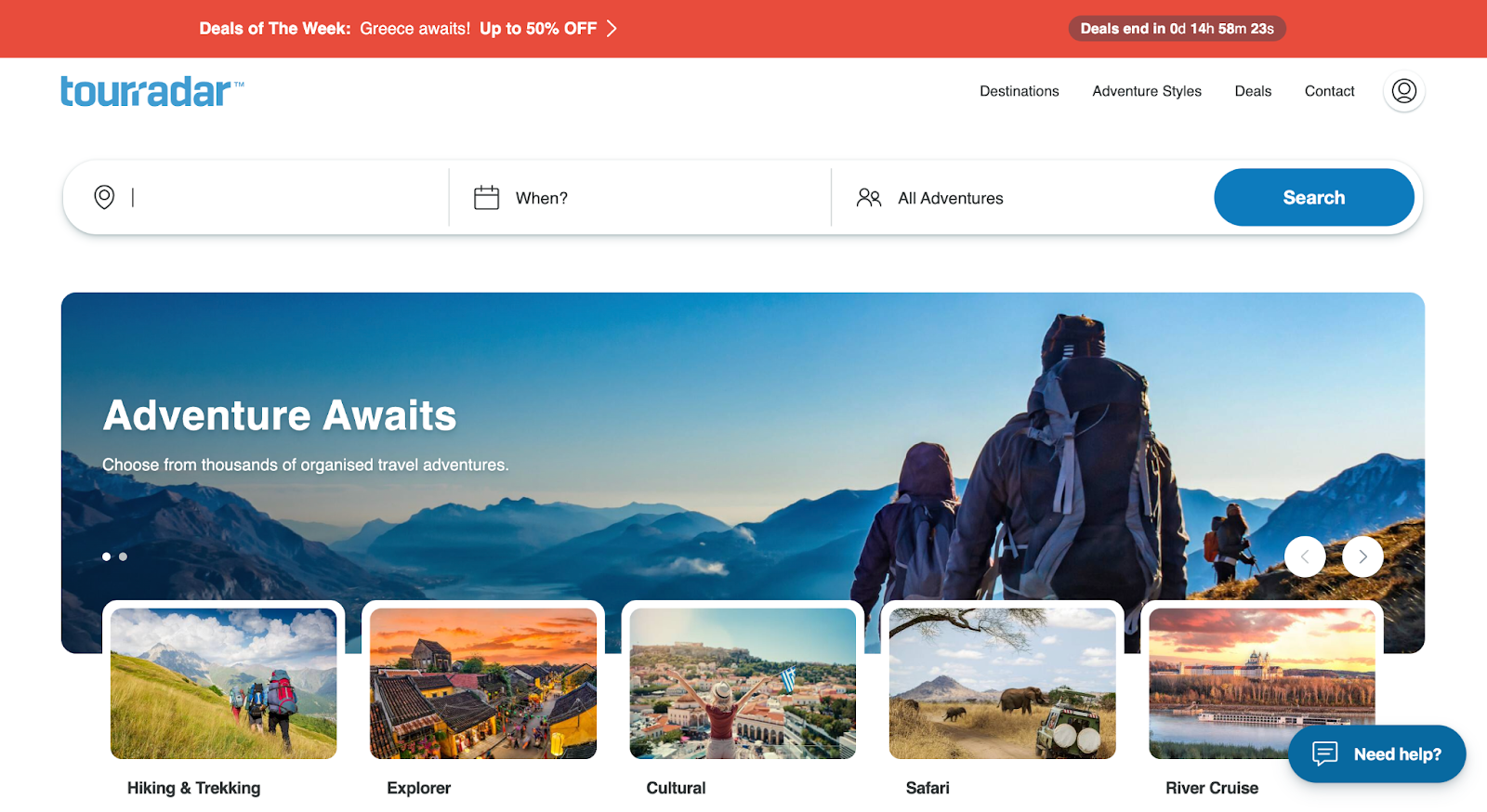
TourRadar is an OTA that focuses specifically on multi-day tours. The platform offers more than 50,000 tours in 160 countries around the world. TourRadar was founded in 2010 as one of the first OTAs to offer private and group tours that span multiple days.
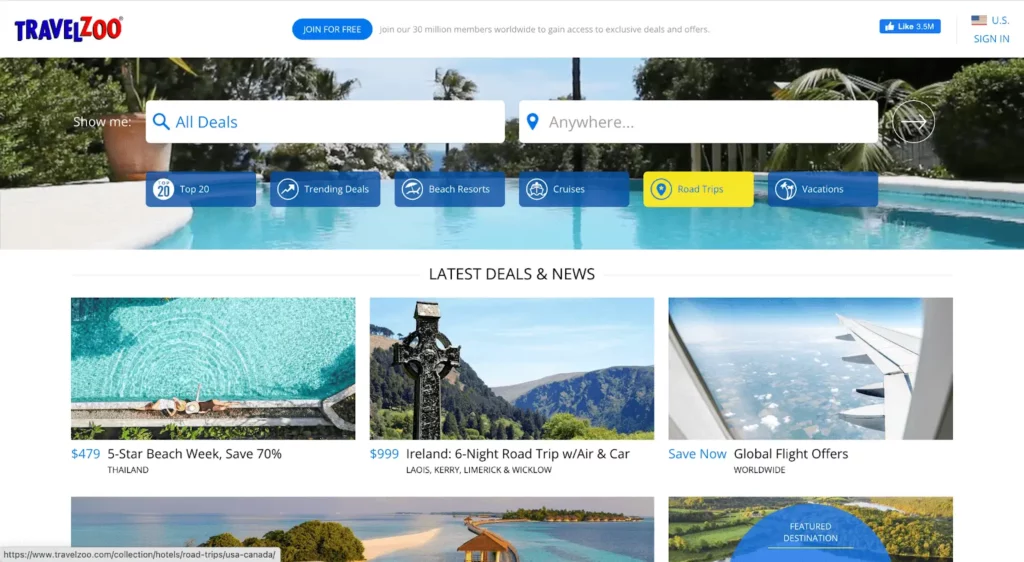
Travelzoo works with over 5,000 suppliers to offer travel, entertainment, and lifestyle experiences to over 6 million visitors every month. The platform also aggregates the best travel deals for hotels, flights, vacation packages, cruises.
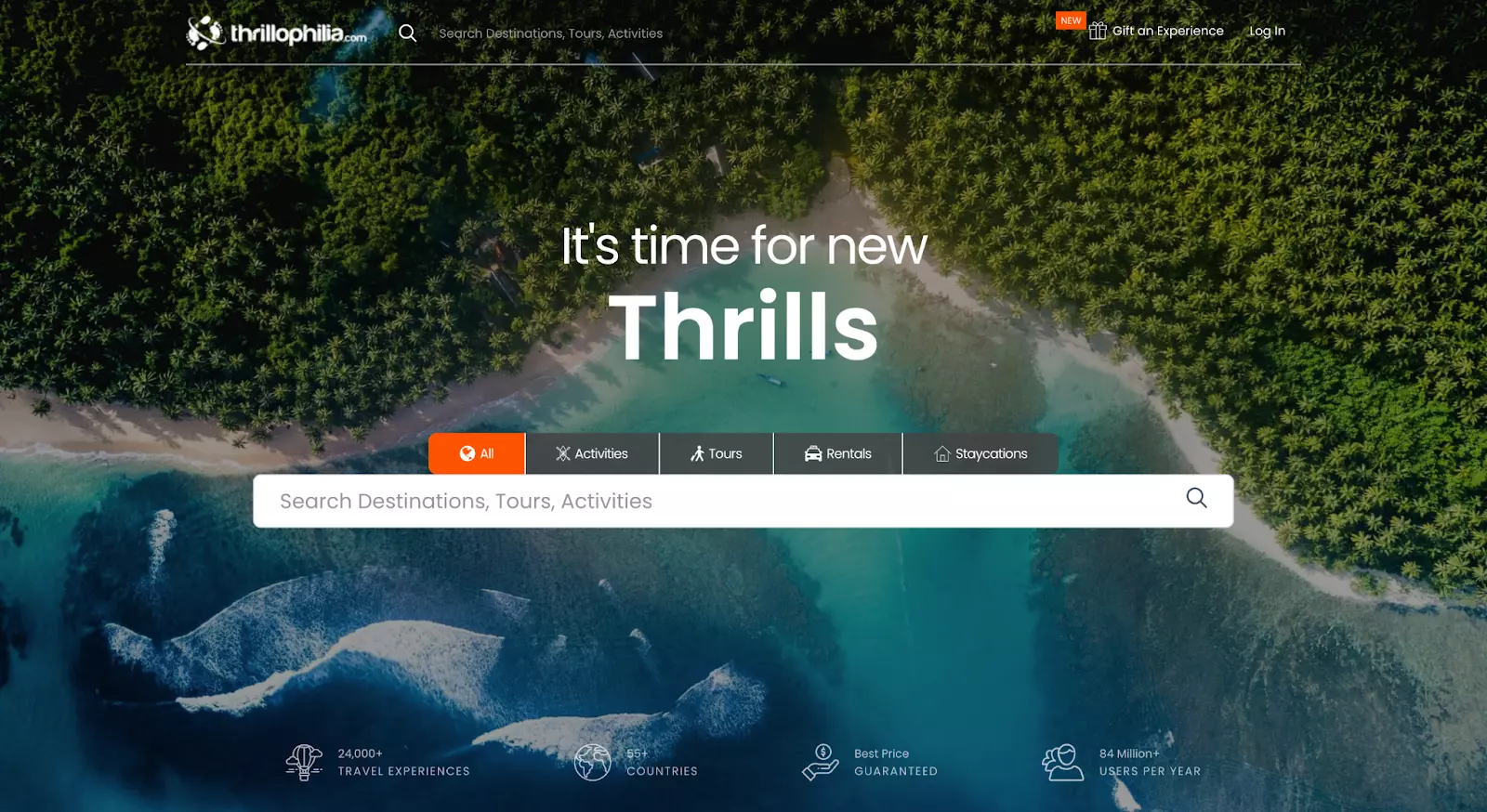
The Thrillophilia marketplace has over bookable 12,000 activities across 125 destinations. The company started with experiences in Bangalore, and today sells experiences in 15 Asian countries with Dubai, Thailand, Singapore, and Bali leading the charts after India. There are more than 5,000 suppliers selling tours and tickets on the platform.
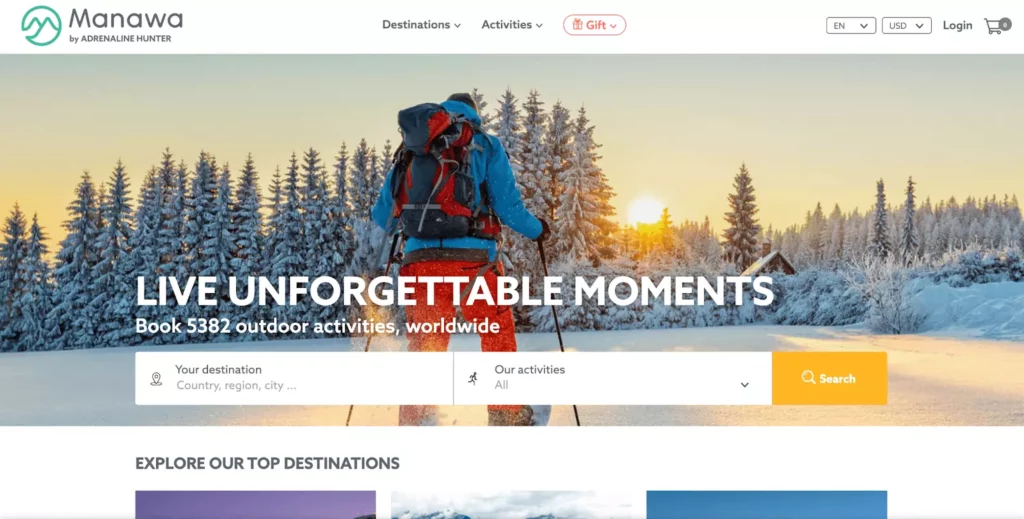
Manawa is a booking platform focused on outdoor activities like scuba diving, hiking, and helicopter tours. It currently has over 5,000 activities listed across 59 countries. Experiences are divided into six categories, including the “crazy” category where you’ll find crocodile diving, survival training, and other wildlife experiences.
Booking.com is the leading OTA in the hospitality industry. The company owns several big-name brands, including Booking.com, Priceline, Agoda, Rentalcars.com, KAYAK, and OpenTable. It also counts with a number of smaller OTAs like Rocketmiles, HotelsCombined, Cheapflights, and Momondo as part of its network.
Agoda is a popular OTA based in Singapore. The Agoda website offers hotels, vacation rentals, and flights in 39 different languages. It’s one of the many brands owned by Booking Holdings.
Trip.com is a full-service travel agency offering hotels, flights, cars, as well as tours and attraction tickets online. The website is owned by Trip.com Group, one of the largest OTAs in the world with over 400 million users worldwide. The Singapore-based company also owns Skyscanner.
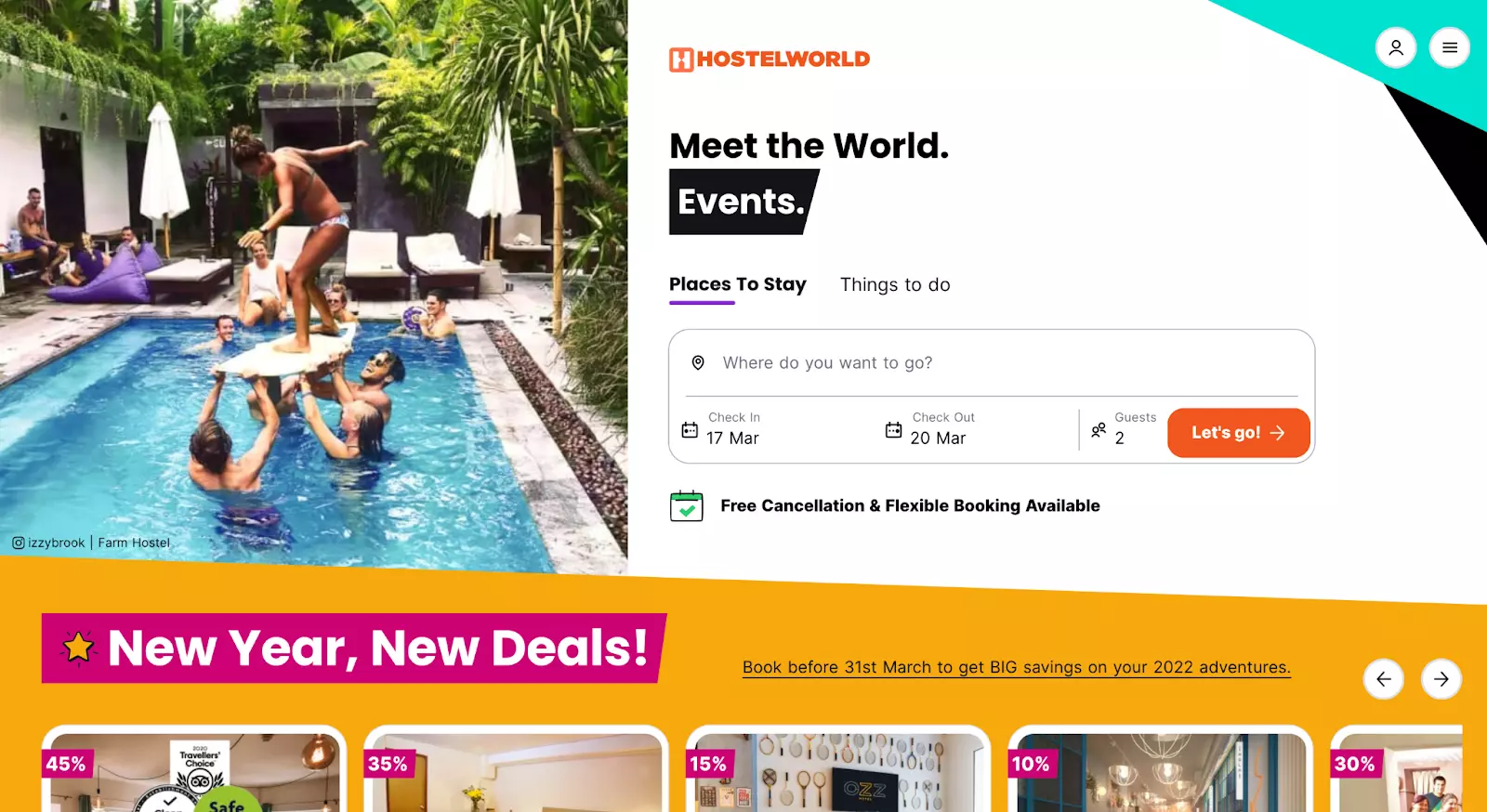
Hostelworld is the leasing OTA for hostel accommodations. The platform has more than 17,000 hostels listed across 179 countries. It has amassed over 13 million reviews since it was founded in 1999.
eDreams is a Barcelona, Spain-based OTA offering flights, hotels, car rentals, holiday packages, and travel insurance. The company currently operates in 40 countries, including Spain, Italy, France, Portugal, the UK, and the U.S. In 2011, eDreams became the first international OTA to expand into Turkey.
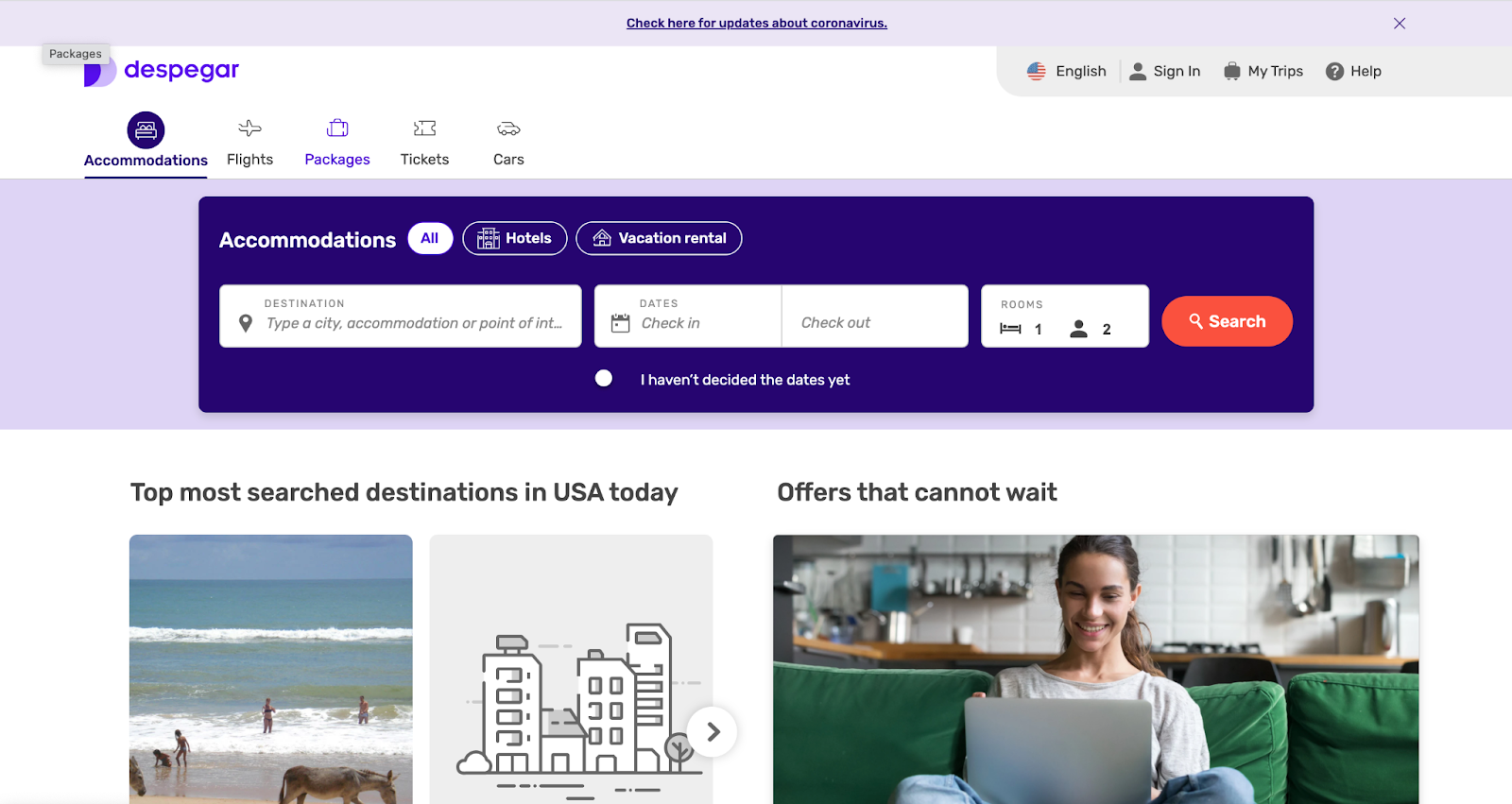
Despegar is the leading OTA in Latin America. The company owns two brands: The global brand Despegar and the Brazilian brand Decolar. The OTA offers airfare, hotel bookings, travel packages, and other travel products.
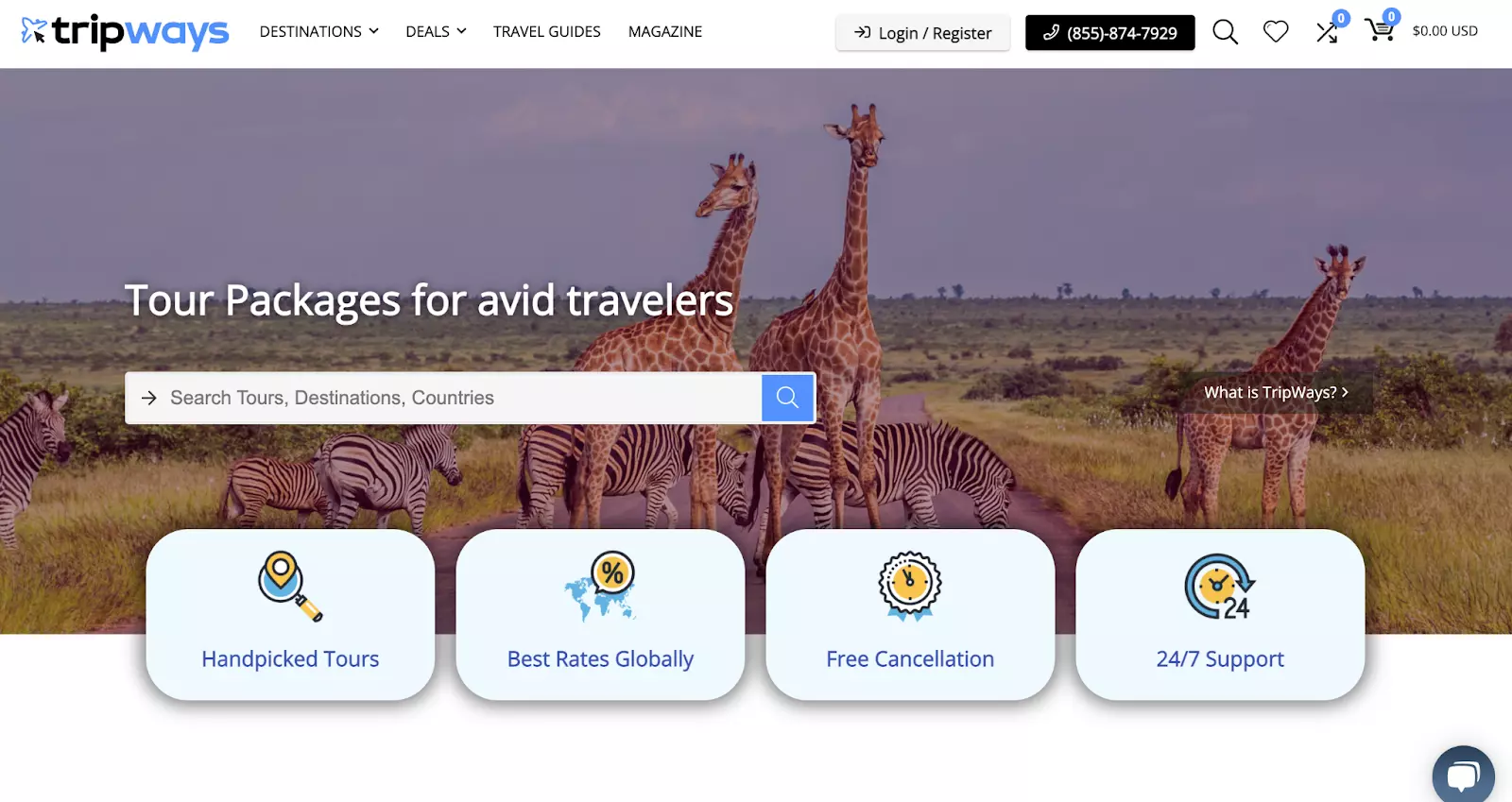
TripWays connects travelers to local tour companies and guides around the world. The OTA focuses on cheap flights, cheap hotels, tour packages, travel insurance policies, and visa services. It works with a limited number of tour operators for each destination, with a focus on multi-day and all-inclusive tours.
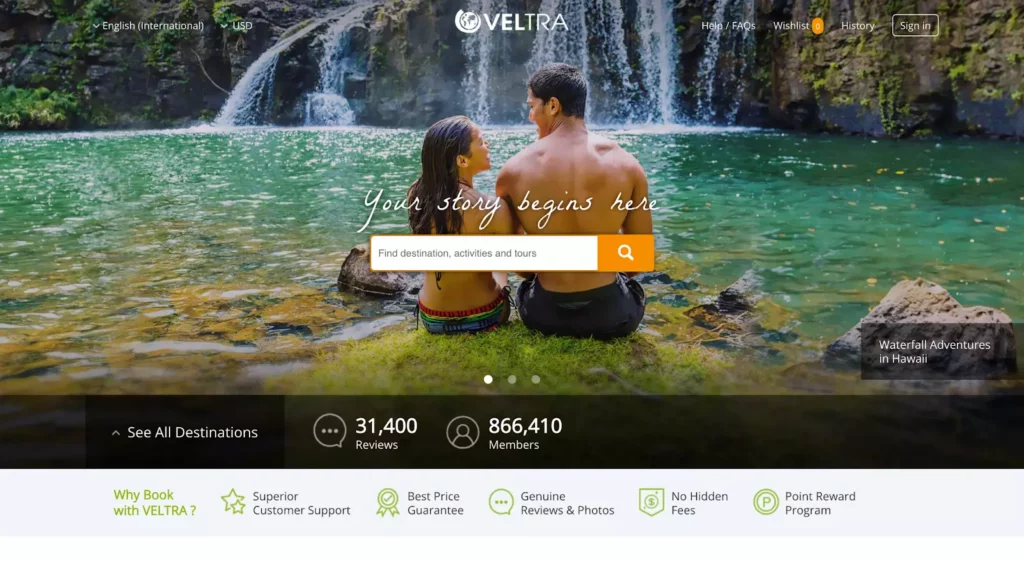
Veltra is Japan’s leading experience-focused OTA. It offers tours and activities across 150 countries. Founded in 1991, it was one of the first OTAs to offer bookable tours and activities online.
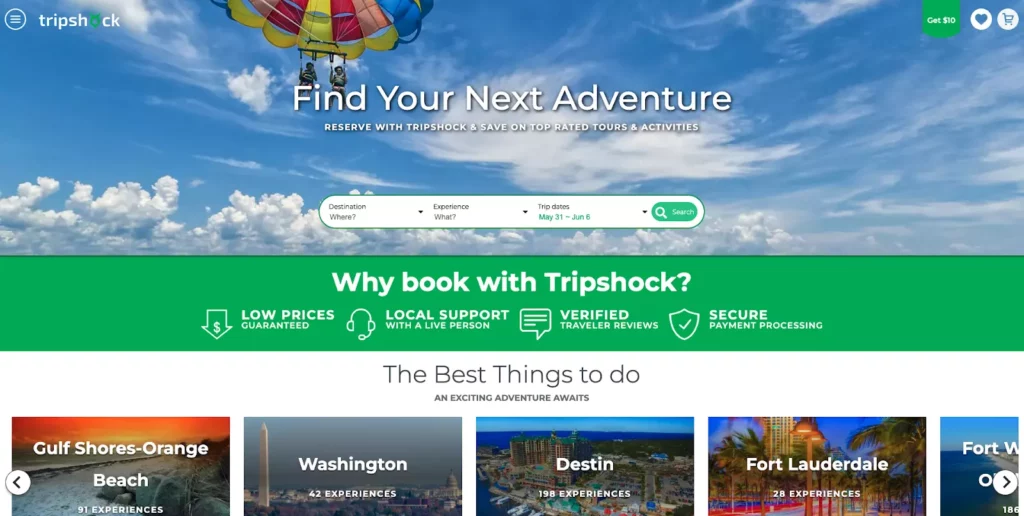
TripShock is a niche OTA focused on tourism excursions in and around the Gulf of Mexico and the Southeast. The Florida-based OTA offers activities in over 40 destinations spanning the region, including 1,000 tours, tourist attractions, and outdoor activities mostly suitable for individuals, couples, or families. The OTA was recently added to the many integratrations offered in Xola .
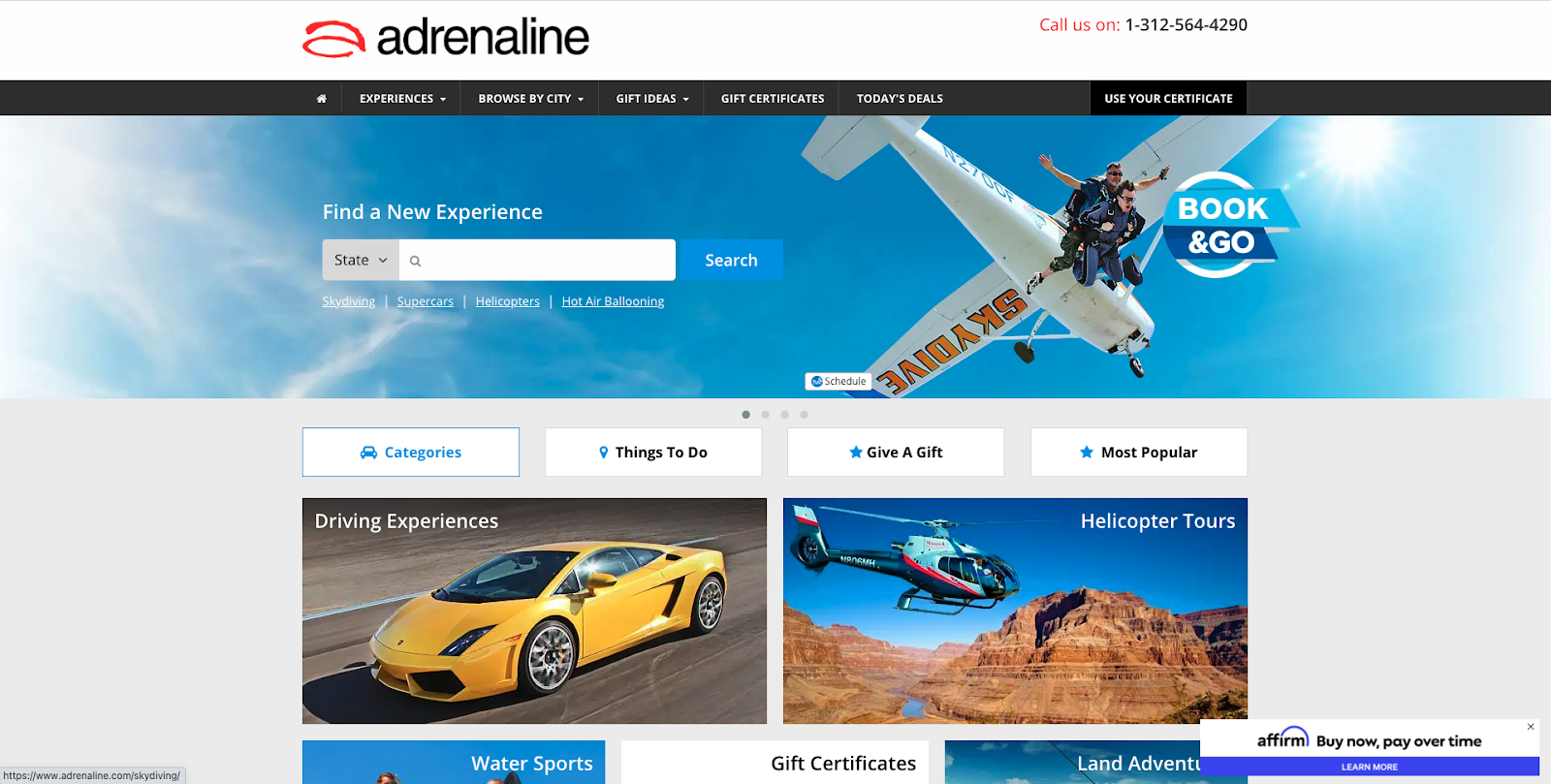
Adrenaline is an adventure-focused OTA offering 1,400 different travel excursions ranging from skydiving and helicopter tours to whitewarer rafting and zipline tours. It’s one of many OTAs that can be easily connected with Xola .
There are dozens of smaller OTAs on the market, but understanding how they work will help your business choose the best one.
It’s important to weigh the pros and cons of selling your experiences through an online marketplace — and try not to rely on them for all of your online bookings.
Writer Carla Vianna
Related Articles

Bookings vs. recognized revenue – what’s the difference
While your booking volume is an important metric to watch, it’s not the only factor that ensures your company’s financial

13 Tips To Be a Better Tour Guide
Being a tour guide is a fun, exciting, and rewarding job. You spend your days sharing your knowledge and chatting

How to calculate capacity utilization
Is your attraction operating at its full design capacity potential? Key performance indicators, like your capacity utilization metric can help
Get the latest news and resources.
For tours and attractions delivered straight to your inbox each week.
Transform your business now.

- Online Booking
- Travel Services
- Global Content & NDC
- Policy Management
- Traveler Safety
- Sustainability
- Real-time Analytics
- Carbon Removal
- Traveler Experience
- Travel Cost Savings
- Global Platform
- Integrations
- Expense Management Providers
- Financial Services Providers
- Technology Providers
- Travel Suppliers
- Travel Management Companies
- White Labeling
- Partner Success Model
- Platform Overview
- API Documentation
- Security and Trust
- Case Studies
- Resource Library

What Is an OTA (Online Travel Agency)?
Online travel agencies (OTAs) are a popular way for business and leisure travelers to book flights, hotels, and rental cars.
While OTAs offer convenience, they lack the comprehensive features that make it easy for businesses to manage their travel budgets and provide service to business travelers.
That’s why many companies turn to dedicated corporate travel management companies (TMCs) and online booking tools (OBTs) instead of using an OTA for business travel.
For travel managers, it’s important to be aware of and understand the benefits and shortcomings of using an OTA for business travel. Here’s everything you need to know about OTAs and why your business travel program will benefit from a dedicated corporate travel platform.
What is an OTA?
An online travel agency is a website where travelers can book flights, hotels, rental cars, cruises, tours, vacation packages, short term rentals, and more.
The first OTAs launched in 1996: Travelocity , which stemmed from a partnership between American Airlines and Sabre, and Expedia , which was created from a partnership between Microsoft and Boston Consulting Group.
These companies brought self-service travel booking to the Web for the first time at scale. Before then travel had to be booked through brick-and-mortar travel agents or directly with suppliers. There were outliers, like the eAAsySabre tool in the late 1980s and the web-based Hotel Reservations Network in 1995, but OTAs were the first to bring together multiple types of travel products in one full-service shopping environment.
These early OTAs were primarily focused on providing a simple and convenient way for consumers to book flights and hotels. However, their offerings were limited compared to what is available today. Popular sites like Priceline , Agoda , and Trip.com followed afterwards.
OTAs generally have two main business models : the merchant model, where a site acts as the merchant of record and sends payment to a supplier after a trip minus its commission, and the agency model, where suppliers are paid directly and send a commission back to the OTA for bookings.
In the late 1990s and early 2000s, the popularity of OTAs began to grow rapidly as more and more consumers began to embrace the internet as a way to book travel. This growth was driven by several factors, including the increasing availability of high-speed internet, the growing number of travel options available online, and the increasing number of consumers who were comfortable making online purchases.
As OTAs grew more popular, these companies began to expand their offerings to include a wider range of travel products and services. Rental cars, vacation packages, and travel insurance were added. Many OTAs also began to invest heavily in their websites and mobile apps, making it even easier for consumers to book travel from anywhere, at any time.
Today, OTAs are an integral part of the travel industry and are responsible for a significant portion of all travel bookings made online.
What are OTA’s best features?
Ota shopping experience.
Online travel agencies provide a good shopping experience to leisure travelers by offering a wide range of travel options in one place. This allows them to quickly compare prices, read reviews, and view photos of different hotels, flights, and rental cars, making it easy to find the best option for their needs.
Additionally, many OTAs offer recommendations, which can help travelers discover new and exciting destinations, activities, and accommodations they may not have considered before.
The process is secure and fast, giving travelers the peace of mind that their booking is confirmed, and providing them with all the necessary information to begin their trip.
Choice of travel options
Online travel agencies offer leisure travelers a wide range of options when considering a vacation.
Many online booking tools provide discounts on packages and bundles as well as reviews from other travelers so that people can make an informed decision about their trip.
OTA travel inspiration
Travelers often find inspiration when researching travel using an online travel agency by browsing through a wide range of options, including destinations, accommodations, and activities. They can read reviews from other travelers, view photos, and compare prices to help them make an informed decision.
Traveler Reviews
It’s rare for travelers to book a trip without reading reviews. Travelers can turn to online travel agencies for verified reviews of hotels, vacations, and other types of travel experiences.
Reading reviews on OTA websites helps travelers feel reassured that they’re making a good choice about the quality of accommodations and services offered at each destination.
Areas where business travel platforms are better than OTAs
Cost savings.
A benefit of using a corporate booking tool instead of an online travel agency is cost savings.
Corporate booking tools can save businesses significant amounts of money by providing access to corporate rates, negotiating discounts from suppliers, and managing group bookings.
Additionally, many corporate booking tools provide customers with tailored reporting so that businesses can easily track expenses and ensure they are getting the best deal for their travel needs.
Policies and travel inventory
Modern corporate travel platforms like Spotnana provide access to travel options from OTAs like Expedia and Booking.com in addition to a wide array of global content. This means that employees can still access the same deals and offers that they would find on an OTA, but they can do so within the context of the organization’s travel policy. This can help to ensure that all travel is compliant with company guidelines and can help to control costs by presenting preferred and negotiated rates.
At the same time, having comprehensive travel inventory options in one place makes it easier for employees to find and book the right travel arrangements for their needs.
Using a modern corporate travel platform like Spotnana helps streamline the travel booking process . This is particularly beneficial for organizations with many travelers. This can save time and resources, and can help to ensure that all travel is booked in a timely and efficient manner.
When businesses choose to use a corporate booking tool instead of an online travel agency, they benefit from the added level of service that comes along with it.
Corporate online booking tools and travel management companies provide comprehensive support to travelers and businesses with complex itineraries and needs, such as managing large groups or negotiating corporate rates. They also offer timely support from experienced travel agents with shorter wait times and personalized service across the phone, email, and chat.
Using a corporate travel platform instead of an OTA can save businesses significant amounts of time and effort.
Reporting and analytics
If business travelers book across a variety of consumer sites, it’s impossible for travel managers and finance professionals to have a full understanding of travel spending and traveler behavior in real time.
Business travel platforms like Spotnana offer real-time reporting features, allowing organizations to easily track and analyze all aspects of their corporate travel program . This includes everything from flight and hotel bookings, expenses, and employee behavior, to travel policies and more. This level of detail and customization makes it easier to identify areas for cost savings and to optimize the travel program for maximum efficiency and savings.
Business travel platforms also integrate with other systems used by the organization, such as expense management and accounting systems. This integration eliminates manual data entry, reducing the risk of errors and ensuring that all data is up-to-date and accurate. A modern business travel platform provides a single source of truth for all travel data, making it easier to analyze and make informed decisions.
Security and duty of care
Businesses also benefit from added security when using a corporate booking tool instead of an online travel agency. Corporate booking tools provide businesses with additional layers of security by verifying the identity of travelers, ensuring that they remain compliant with company policies, and providing access to real-time updates on flight statuses and other important travel information.
Spotnana offers safety tools including a Live Map that shows the location and status of every traveler in your program.
What is an OTA versus an OBT?
Businesses that choose to use a corporate booking tool instead of an online travel agency can benefit from cost savings, better service, and a streamlined booking processes.
Additionally, modern corporate travel platforms include inventory provided by online travel agencies, making it easy to get a wide variety of travel options with better visibility and control over travel spend. Corporate online booking tools can help ensure that all travel is compliant with company policies and within budget, making it a valuable asset for any organization looking to maximize the efficiency and efficacy of their travel program.
Want to learn more about how you can transform your travel program? Get a demo of Spotnana today.
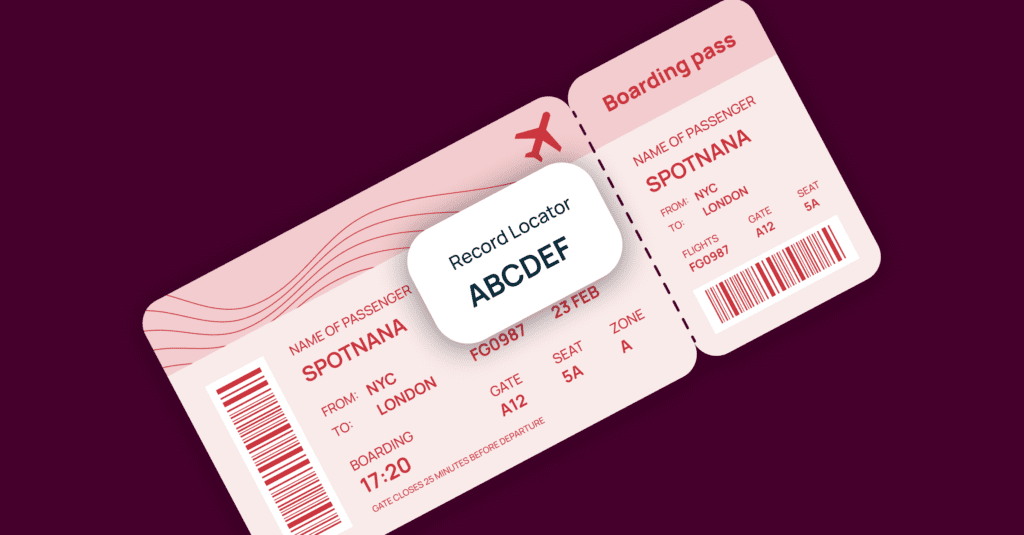

+39 0473 538800 Zona industriale 1/5 - Eurocenter . 39011 Lana South Tyrol Italy [email protected] www.additive.eu . VAT-ID IT02476330218
Online travel agencies (OTAs) offer users the possibility to book their holidays online. Well-known platforms such as Booking, HRS, or Expedia provide additional information like hotel reviews, travel tips, or package holidays. Often OTAs also act as tour operators. Hotels and tourism-related businesses can register to reach potential guests. In order to do so, information such as room availability and prices must be provided. If a stay is booked through the online travel agency, usually the hotel or tourism-related business has to pay a commission fee. Nowadays the majority of reservations are made via online travel agencies, transforming them into an important distribution channel for tourism businesses.

- Revenue Management
- Hotel Consulting
- Operations Management
- Asset Management
- Pre-Opening
- Owner Representation
- Turnaround Management
- About Xotels
OTA – Online Travel Agency
What is the meaning / definition of OTA , in the hospitality industry ?
OTA stands for: Online Travel Agency .
OTAs are online companies whose websites allow consumers to book various travel related services directly via Internet. They are 3rd party agents reselling trips, hotels, cars, flights, vacation packages etc. provided / organised by others.
Travel shopping via online agencies has become very popular nowadays. Especially in the last minute segment and also because of the frequent usage of the smartphones. Today consumers are on-the-go and the advantage of a booking engine and the reservation solutions provided by the OTAs is that it offers instant payment and booking confirmation.
Examples of the most commonly known OTAs are:
- The Priceline Group ( Booking .com, Priceline.com, agoda.com, KAYAK, rentalcars.com, OpenTable)
- Expedia, Inc. (Expedia.com, Hotels.com, Egencia, Hotwire, Trivago, Venere.com, CarRentals.com, Classic Vacations, Expedia CruiseShipCenters, Expedia Local Expert (LX), Wotif Group, Travelocity)
- TripAdvisor Inc (tripadvisor.com)
- Opodo (opodo.com)
Synonyms for OTA are Alternative Distribution System ( ADS ) and Internet Distribution System ( IDS ).
- Electronic Distribution ( ED )
- Distribution Strategy
- Channel Management
- Online Travel Agency
Share This Story, Choose Your Platform!
About the author:.

What Does OTA Mean in Tourism?
By Anna Duncan
If you’ve ever booked a hotel room or a flight online, chances are you’ve come across the term OTA. But what exactly does OTA mean in tourism? In this article, we’ll dive into the world of online travel agencies and what they offer.
What is an OTA?
OTA stands for Online Travel Agency. These are websites that allow users to book travel-related services such as flights, hotels, car rentals, and more. Some of the most popular OTAs include Expedia, Booking.com, and Priceline.
How do OTAs work?
OTAs work by aggregating inventory from various travel suppliers such as airlines and hotels. When a user searches for a particular destination or travel service on an OTA website, the site searches its inventory to find available options that match the user’s search criteria.
Once the user selects a service they want to book, the OTA processes the payment and sends a confirmation email with all necessary details. In exchange for their services, OTAs typically charge a commission fee to suppliers.
What are the benefits of using an OTA?
One of the biggest benefits of using an OTA is convenience. Rather than having to visit multiple websites or call various suppliers to compare prices and availability, users can easily search for and book everything they need in one place.
Another benefit is access to exclusive deals. Many OTAs offer discounts or special promotions that users wouldn’t be able to find elsewhere. Additionally, some OTAs offer loyalty programs that reward frequent users with perks such as free upgrades or room discounts.
Are there any drawbacks to using an OTA?
While there are certainly benefits to using OTAs, there are also some potential drawbacks to keep in mind. One common issue is hidden fees – some OTAs may not disclose all fees upfront which can lead to surprises when it comes time to pay.
Another potential downside is lack of flexibility. Because OTAs are essentially middlemen between users and travel suppliers, they may not be able to offer the same level of flexibility or personalized service as booking directly with a supplier.
10 Related Question Answers Found
What does ota stand for in tourism, what is an ota in tourism, what are otas in tourism, what is wata in tourism, what does nto mean in tourism, what is nta in tourism, what is abta in travel and tourism, what is tiaa in tourism, what is asta in tourism, what is an nto tourism, backpacking - budget travel - business travel - cruise ship - vacation - tourism - resort - cruise - road trip - destination wedding - tourist destination - best places, london - madrid - paris - prague - dubai - barcelona - rome.
© 2024 LuxuryTraveldiva
What Are OTAs & Why They Will Change the Travel Industry Forever

Definition of Online Travel Agencies (OTAs)
Key characteristics of otas, types of otas, how otas work, benefits of using otas for travelers.
In 2023, 72% of travelers preferred to make their travel arrangements online. As much as 80% of them relied on OTAs rather than Google, social media, and meta-travel websites.

Traveler habits and preferences indicate that OTAs are no passing trend. For those in the travel business, that means only one thing: OTAs are crucial for survival and success in the industry. Understanding what they are, how they work, and what benefits they offer is no longer optional.
Everyone uses OTAs, but most people outside the industry don’t know them under their acronym – or what it stands for – even when they have a broad idea of how they work.
What are OTAs?
OTA is short for Online Travel Agency, a website, platform, or marketplace that allows travelers to buy travel-related products and services. Using an OTA, anyone can book a flight, reserve a hotel room, rent a car, buy event tickets, or book a cruising trip.

Some of the most used and globally known online travel agencies are:
- Booking.com
- TripAdvisor Rentals
- Hostelworld
- Lastminute.com
OTAs are similar to metasearch engines like Google Hotels , but the two are not the same. The key difference is that travelers can book travel products and services directly from OTAs. These agencies serve as online reservation systems for researching and comparing travel options.
How do OTAs differ from traditional travel agencies?
As a direct link between travelers and travel suppliers, OTAs are a serious threat to traditional travel agencies. While they are completely online-based, many modern travel agencies offer a combination of online and offline services. All their differences stem from this main one.
In OTAs, travelers have dedicated self-service centers with more travel options than they can choose. As opposed to that, traditional agencies put an emphasis on human relations and personalized service. Both options have their pros and cons, as well as their loyal target audience.
Online travel agencies rose to prominence after the Great Financial Crisis, which marked the golden era for industry leaders like Expedia and Booking.com. Although the OTA market share is not as formidable as it once was, it still puts traditional travel agents at dire risk of irrelevance.
The role of OTAs as intermediaries between travelers and travel service providers
Although we call them “agencies,” OTAs don’t employ travel agents or do any agent work, at least not in a traditional sense. They simply provide space for rental and vacation managers, airlines, and other travel service providers to make their offers directly to potential customers.
Let’s say you want to go to Croatia for a summer vacation. If this is your first time visiting the Balkans and you want to travel the coast by boat and visit Dubrovnik, but you don’t speak the language, it’s probably easier (and safer) for you to outsource everything to a travel agent.
But if you’ve arranged your own trips before, why pay a travel agent when you can get everything you need on Airbnb? OTAs bookings cost less because the fee is charged to service providers. Are they more convenient? Well, that depends on the type of traveler and the trip.
A typical OTA is like Google for travel – it’s comprehensive, convenient, and trustworthy. Aside from these industry-disrupting traits, some other key characteristics of OTAs are:

Online platforms for researching, comparing, and booking travel services
OTAs are online platforms that facilitate booking, but they do more than that. Like search engines, these agencies allow travelers to research desired locations before they pick a destination and book a room. Users can filter search results by budget, facilities, property type, review score, etc.
Search filters like these are incredibly helpful and contribute to OTAs’ great success. They allow travelers to find what they’ve pictured, no matter how specific their desires and requirements are. If you want a beachfront villa with a gym and a poker room, just tick the right boxes.
Another advantage of using OTAs is the ability to compare offers and prices from multiple travel service providers. So, in addition to finding just what they need, travelers can also get it for the most affordable price. It’s precisely that searchability that gives OTAs their disruptive power.
A wide range of travel products offered
Can OTAs really help you plan entire trips? Absolutely, yes. The wide range of travel-related products and services offered by online travel agencies typically include the following:
- Accommodation – Hotels, apartments, villas, holiday homes, resorts, and more.
- Flights – One-way and round trips, domestic and international flights, and more.
- Car rentals – Reliable rentals at affordable prices by popular car hire brands.
- Airport taxis – Standard or executive airport transfer per number of passengers.
- Attractions – Explore tours and activities, book priority tickets, and more.
- Vacation packages – Create your own travel bundles with stay, transport, tours, etc.
And it’s not only various product categories that can be found on OTA websites. Even more importantly, travelers can explore many different types of products and services, including property and room types, car brands, excursions, etc. There are also detailed descriptions and pictures.
Aggregation of prices and options from multiple travel service providers
If you type “New York” in the Airbnb search box, more than 1,000 results will pop up. That’s more than any travel agent can offer. OTAs are so popular because they showcase numerous options from multiple travel service providers, making travelers spoiled with choices.
User-generated content to inform traveler decisions
One of the major concerns travelers have about travel booking platforms is, “What if the place doesn’t match the description?” OTAs have come up with an elegant solution for this: social proof . Buyers are strongly encouraged to leave detailed reviews with descriptions and ratings.
To say that OTAs have turned user reviews into an art form would not be an overstatement. They, too, can be filtered based on topics such as cleanliness, location, or aesthetics. All guest impressions are dated (so you know what season they apply to) and accompanied by photos.
Secure payment processing and customer support
OTA payments are designed to be fast, secure, and flexible. For added convenience, customers have various payment options, including credit, debit, and prepaid cards; digital wallets like PayPal, Apple Pay, and Google Pay; and local payment options like WeChat and Alipay.
Are OTA payments safe? Sure. They are based on the same security protocols and standards as all other online payments. Encryption and 2-step verification are non-negotiable. Major OTAs like Airbnb, Expedia, and Booking.com guarantee secure transfers and financial data privacy.
On the off chance that a payment goes wrong, customer service is there to help. Online travel agencies don’t have agents, but they have dedicated customer support reps on multiple channels. That usually includes FAQs, live chat, email, and 24/7 phone support for emergencies.
Despite being accessible worldwide, online travel agencies sometimes choose to specialize in a single region or travel segment. Here are the different types of OTAs:

Full-service OTAs
The global market is vast and unpredictable. No single travel agent or tour operator can offer all types of products and services in all destinations in the world. But guess who can? That’s right: OTAs. Full-service OTAs provide an array of destinations and services.
The most prominent names in the industry belong to this wide bracket. Expedia, Airbnb, and Booking.com are good examples of successful full-service travel booking platforms. They offer everything you need to arrange a trip, including spa reservations, concert tickets, and local tips.
Specialized OTAs
Competing with full-service OTAs like Expedia or Airbnb is virtually impossible, so many online travel agencies are forced to quit or specialize. So-called specialized OTAs cater to travelers in need of specific products, like airplane tickets, hotels, or specific types of vacation rentals.
For example, CheapOair is an online travel agency specializing in discounted flights and hotel bookings. Hostelworld is one of the most famous agencies for budget-friendly accommodations like hostels and low-cost hotels, while Vrbo offers condos, cabins, and other vacation rentals.
Regional and global OTAs
OTAs can be regional or global, depending on their area of coverage. Similarly to local agents, regional online travel agencies are closer to the destinations you want to travel to, and not just geographically. They usually have local guides recommending tours and writing travel guides.
Some of the best regional OTAs are Indy Guide (Central Asia), Travello (Australia and New Zealand), Civitatis (Spain and Latin America), LinkParis (Paris), LovetoVisit (UK), Swiss Activities (Switzerland), TrueStory (Scandinavia), Tripster (US and Canada), and Almundo (Latin America).
How do OTAs work? Most people assume that online travel agencies make money in a similar way travel agencies do. That’s not far from the truth, but it’s only one piece of the puzzle.

The OTA business model
Different OTAs make revenue in different ways based on their business model:
- Commission – Many OTAs (Airbnb, Booking.com, Expedia) employ a commission model, where they allow hosts and other travel service providers to list their offers for free. In return, OTAs receive a percentage of their money every time a booking is made.
- Subscription – Online travel agencies like Furnished Finder charge product and service providers a fixed rate for listings and promotions whether they make a booking or not.
- Advertising – This model is more common on meta-travel websites like Google Hotel Ads, where hosts pay for clicks that take potential customers to their official booking pages.
- Hybrid – A small number of OTAs have a hybrid approach to earning revenue, including commission, subscription, and advertising-based business models.
Relationships between OTAs and travel service providers
As mentioned before, OTAs serve as intermediaries between travelers and travel service providers. Both of them use online travel agencies as self-service platforms. There’s no direct communication with an agent except in rare emergencies when hosts need to contact OTA support.
Everything else is automatic, with a lot of customization options for hosts.
- Getting listed
While every OTA has its own set of guidelines, listing a travel product or service is generally a frictionless process navigated by the website. Hosts are instructed to leave contact information, write descriptions, tick boxes to assign categories to their listing, and add photos of rentals.
- Getting booked
What happens when a booking is made? That’s usually up to the host to decide. The “ instant booking ” option allows guests to automatically book without the host’s approval, but hosts can also choose to vet prospective customers. In any case, booking reveals the host’s contact info.
OTAs sometimes let guests send a message to potential hosts before they decide to book. After that, guests and hosts can continue communication via SMS, email, or phone.
- Getting paid
How do you get paid as an OTA-based host? Again, that varies from one agency to another. VCCs (Virtual Credit Cards) and independent payment are the two common methods. In the first case, an OTA collects and loads money onto a VCC that hosts use like regular credit cards.
Although independent payment processing is sometimes allowed by OTAs with subscription business models, commission-based payments are much more common. Hosts can set cancellation fees and choose a preferred payment system, such as a credit card or bank transfer.
The role of technology in OTA operations
Technology holds limitless possibilities in the travel industry, many of which are already being explored by online travel agencies. Some of the best OTA tech applications include:
- Search algorithms – Like all search engines, OTAs rely on algorithms to rank search results for specific queries. These algorithms are highly sophisticated and can be personalized based on customer data. They include conversion and average daily rate , guest review score ( Booking ), competitive prices, quality content, and cancellation rate ( Vrbo ).
- Pricing optimization – Online travel agencies like Expedia and Booking.com help hosts get more bookings by optimizing their prices. How? They employ data analytics and keep track of supply, demand, proximity, and seasonality. Based on these factors, OTAs recommend or automatically adjust prices to capture travelers’ attention and boost the average daily rate.
- Personalization – More than 71% of customers demand personalized experiences from product and service providers. The travel industry is no exception. Online travel agencies are in a perfect position to provide personalized service because of the amount of customer data they collect daily. Data feeds OTA’s algorithms, allowing them to create custom-tailored bundles and packages based on individual preferences, budgets, and special requirements.
Why are online travel agencies so popular among modern-day travelers? There are several possible answers, but first in line are convenience, accessibility, and option comparison.
Convenience and ease of booking
According to the Trends Global Survey, 76% of global travelers look for apps that reduce the friction and stress of travel planning. Nobody does this better than OTAs. Online bookings are available 24/7 from all devices, but not only that. They are also convenient and easy to use.
The best OTAs have user-friendly interfaces and powerful search filters that allow travelers to research and book trips faster than ever before. Tips and guest reviews contribute to their ease of use and provide recommendations and social proof that further simplify the experience.
Access to a wide range of travel options and prices
OTAs are unmatched in the industry when it comes to the amount of travel products and services they provide. So much so that travelers can plan their trips on a whim, knowing they will never be out of exciting choices – no matter how demanding, frugal, or picky they become.
Here’s an example: not only are there over 28 million accommodation listings on Booking.com, but this online travel giant also allows you to browse based on your current “vibe” – like “romance,” “outdoors,” or “relax.” Expedia and Airbnb have similar options on top of standard filters.
Ability to compare prices and read user reviews
Ample options, searchability, and personalization are a powerful combination. With OTAs, travelers are empowered with choices and can contrast and compare offers and their prices. That is undoubtedly the most attractive characteristic of leading OTAs like Airbnb and Expedia.
Statistics prove that – in 2023, 53% of travelers who used online travel agencies cited it’s because of the speed at which they can plan their trip; 47% said it’s easier to compare prices, and 42% said it’s better to find cheaper deals. Price, location, and reviews are top considerations for OTA users.
Reputable OTAs have secure payment protocols that guarantee speed, convenience, and safety – all with a single click. Most offer a wide range of payment options, as well, allowing travelers to pay for trips using a preferred method, be that a credit card, digital wallet, or bank transfer.
Post-COVID travelers have increasing expectations when it comes to customer service. Premium service, multichannel support, and 24/7 availability are no longer considered a luxury – they are the new norm. Even though they are mostly digitized, most OTAs can afford to provide this level of service.
Online travel agencies are modern-day leviathans – they trump traditional travel agencies in size, impact, and resilience. More importantly, they are a perfect product of their time. Nothing in the travel industry (except for AI) can answer post-pandemic expectations and demands better than OTAs.
One thing is for sure – OTAs will change the industry forever. As technology evolves, human agents will specialize in personal relations and curated service. Online bookings could easily take over all the rest, so professionals, beware. Recognizing OTAs’ significance could be key to a prolific future.
OTAs and metasearch engines both allow travelers to research and compare accommodations, flights, tours, rental car options, and other travel-related products and services. The main difference between them is that you can’t book a trip directly from a metasearch engine. Websites like these only aggregate and promote offers. By clicking on a listing, you get directed to a provider’s official booking page. The engine usually gets a commission based on a pay-per-click model.
Most online travel agencies don’t charge travel product and service providers for listing offers on their websites, but they take a commission from every booking. Other ways OTAs make money is from fixed subscriptions, ads, or a combination of all these elements.
While OTAs have many advantages, some possible downsides of using online platforms for planning and booking a trip include a lack of personalized customer service and deep customization options. Compared to a travel agent, an online travel agency can never meet the expectations of luxury travelers. OTAs also fall short in arranging complex group trips, such as destination weddings. In addition, OTA prices are sometimes higher than prices set by providers.
The most important factors to consider when choosing an OTA to book with are the selection of travel options, searchability, ease of use, price transparency and discount deals, cancellation fees and refund policies, payment options and security, and customer service and support. Challenges in Room Mapping: discuss common difficulties such as inaccuracies, time consumption, and the need for constant updates. Technological Advances: discuss new technologies like blockchain, NLP, or big data analytics that are influencing room mapping. Case Studies: share real-world examples of companies that have successfully implemented the hotelmize room mapping solution and what improvements they achieved. ROI of Room Mapping: explain how effective room mapping can lead to increased profits and customer satisfaction. Compliance and Standards: discuss if there are any industry standards or regulations affecting room mapping. Choosing a Room Mapping Service: criteria to consider when choosing a mapping service, perhaps including a comparison table of popular options.

Subscribe to our newsletter
Yay you are now subscribed to our newsletter.
Cristóbal Reali, VP of Global Sales at Mize, with over 20 years of experience, has led high-performance teams in major companies in the tourism industry, as well as in the public sector. He has successfully undertaken ventures, including a DMO and technology transformation consulting. In his role at Mize, he stands out not only for his analytical and strategic ability but also for effective leadership. He speaks English, Spanish, Portuguese, and Italian. He holds a degree in Economics from UBA, complementing his professional training at Harvard Business School Online.
Mize is the leading hotel booking optimization solution in the world. With over 170 partners using our fintech products, Mize creates new extra profit for the hotel booking industry using its fully automated proprietary technology and has generated hundreds of millions of dollars in revenue across its suite of products for its partners. Mize was founded in 2016 with its headquarters in Tel Aviv and offices worldwide.
Related Posts
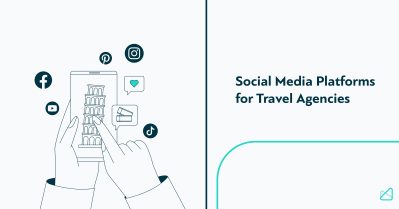
Top 5 Social Media Platforms for Travel Agencies and How to Make the Most of Them
10 min. Gone are the days when travelers sought to disconnect from technology. Today, 74% of people say they use social media while traveling. Sharing travel experiences through photos, videos and status updates is a clear sign that potential customers are out there, using social media not only for travel inspiration, but also for planning […]
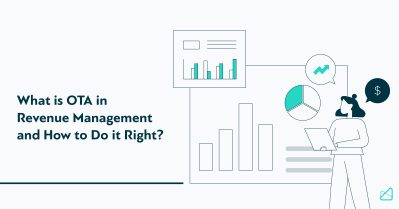
What is OTA in Revenue Management and how to do it right?
11 min. A hotel revenue management strategy is usually a comprehensive strategy encompassing various analytics and demand forecasting tasks to custom tailor pricing and distribution strategies. While there are many independent hotels, most hotels list their accommodations through OTAs. But where does that leave OTAs? The OTA market is quite dynamic and has some serious […]
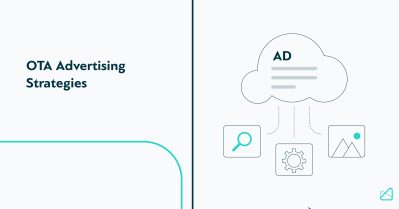
5 OTA Advertising Strategies That Work
8 min. Online travel agencies or simply OTAs have plenty of opportunities to market their offer to the target customers. Some strategies focus more on generating exposure, while others generate more leads and increase conversion rates. There are also more and less efficient advertising strategies. One common question that continues to trouble online travel agents […]

What is an OTA?
The definition of an online travel agency (OTA) is a website that sells travel-related products, including airline tickets, car rentals, cruises, experiences, accommodations and more.
Vacation rental managers would utilize OTAs that specialize in renting temporary housing to travelers. Some well-known OTAs in this category include Airbnb, Booking.com, TripAdvisor Rentals, HomeAway, Vrba, Expedia and FlipKey.
How Do Online Travel Agencies Work?
An OTA allows vendors in the travel industry like vacation rental owners and managers to list and advertise their products, usually free of charge.
The channels earn money by taking a commission on every sale. OTA rates and pricing vary between platforms, with commission ranging from approximately 3% to 25%.
How Do I List My Rentals on OTAs?
Though each OTA has its own specific guidelines, most will walk you through a simple sign-up process, during which you’ll relay details about your property, and then create a listing description , upload photos of your rental, check off the amenities you provide and set your prices.
How Does the Booking Process Work?
Once you’ve completed the process, you can publish your listings and wait for booking requests to come in, unless you’ve enabled guests to instantly book your properties without requiring your approval. In this case, you’ll receive direct reservations rather than requests.
Travelers will generally search for rentals based on date, location and the number of guests in their party, but they can also apply a variety of additional filters, like room type, amenities and facilities.
Initial communication with prospective guests will take place through the channel inbox. With some platforms, once a booking has been made, guests will be able to access the contact information you’ve provided and can then reach out to you personally, either via phone, email or SMS.
How Do I Get Paid for Bookings Made Through OTAs?
Payment policies vary across channels. While some channels process payments on your behalf and then release your cut of the revenue at a certain stage in the reservation, others may allow you to process the payments independently. Hosts can choose how they wish to be paid (i.e. via credit card or bank transfer).
How Do I Get Reviews?
After your guests check out, it is a good idea to kindly request that they review you on the original booking channel, as prospective guests often base their booking decisions on other guests’ reviews. In some cases, the channel will reach out on your behalf and ask guests to rate their experiences.
You will often be prompted to review your guests as well since guest reviews give hosts some indication of how trustworthy and responsible guests are before accepting their booking requests.
Read more about Vacation Rental Management Software
What to Include in Your OTA Listing Profile The Most Popular OTAs for Short-Term and Vacation Rentals How to List and Manage Rentals on Multiple OTAs
See Guesty in Action

Online travel agency (OTA)
An online travel agency or OTA is a business that allows users to search and book travel products such as air tickets, lodging, car rentals , tours, cruises, and more. In other words, OTAs are intermediaries between travel inventory suppliers (airlines, hotels, tour operators , etc.) and customers (usually they are travelers or other OTAs).
OTAs often act as tour operators making tour packages and also provide additional travel-related information like reviews, tips, and so on.
OTAs source most of their inventory either directly from end suppliers (via APIs or an extranet) or through such middlemen as GDSs , air consolidators , bed banks , hospitality marketplaces , other OTAs, channel managers , etc. (typically, via API integration).
On the customer side, OTAs have an online search and booking interface for travelers to make reservations and often a set of APIs for efficient B2B connection with distributors.
The biggest OTAs today are Expedia Group (including Expedia, Vrbo, Travelocity, etc.) and Booking Holdings (including Booking.com, Priceline, Agoda, etc.).

Recommended content for you
Video: travel tech expert breaks down launching an online travel agency.

Flight Centre: Behind Australia’s Leading Travel Agency

Travel Agency Franchise Explained

Rate Parity in Hospitality: Hotels vs OTAs

Understanding the Online Travel Agency Business: Partners, Building Blocks, How to Grow
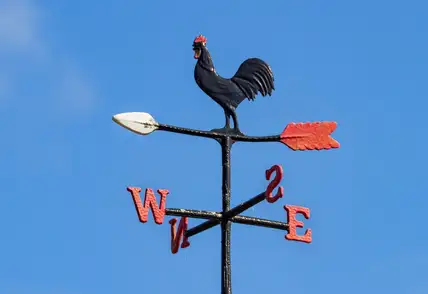
Online Travel Agency Analytics: Data-Driven Approach to the Best-Cost Strategy

Marketing for Travel Agencies: Understanding and Surviving in the Online Travel Industry
Our website uses cookies to ensure you get the best experience. By browsing the website you agree to our use of cookies. Please note, we don’t collect sensitive data and child data.
To learn more and adjust your preferences click Cookie Policy and Privacy Policy . Withdraw your consent or delete cookies whenever you want here .
Get in Touch
Yes, I understand and agree to the Privacy Policy
New Research: 5 Things Hoteliers Need to Know About OTA Travelers
March 31st, 2021 at 10:00 AM EDT
New research shows that travelers that book trips via online travel agencies will play a significant role in hospitality’s recovery. Hoteliers that keep the evolving wants and needs of OTA travelers in mind will have an advantage as properties reimagine how they do business.
Travel providers continue to feel the effects of the Covid-19 pandemic, but many would agree that as widespread vaccine inoculations roll out, rapid testing sophisticates, and health passports are developed, there is a light at the end of the tunnel.
As hospitality leaders prepare for the beginnings of travel’s recovery, paying close attention to new behaviors and demands of travelers will be key. According to new research from Expedia Group done in partnership with global research firm BVA BDRC , travelers that book trips with online travel agency sites (OTAs) will be valuable to the industry’s rebound. Expedia Group’s economic impact study, which looks at OTA traveler behavior and spending patterns across the U.S., the UK, France, and Mexico through the lens of Covid-19, found that the contribution of OTA travelers — especially in the domestic category, where initial rebound will be strongest — should not be overlooked.
“Historically, OTAs have contributed a significant amount of value to the tourism industry and the overall economy — from the spend generated by OTA travelers, to the number of jobs generated — and we expect this to continue as the industry recovers from the impacts of the pandemic,” said Melissa Maher, senior vice president, Marketing and Industry Engagement, Expedia Group. “Because OTA customers tend to travel for leisure, and place value on overall trip experience, their spending patterns make them valuable guests as properties reopen their doors.”
Here, we look at five takeaways from the research that hoteliers should keep in mind about OTA travelers as properties reopen their doors.
1. OTA travelers spend on par, and sometimes more, on their accommodation and on amenity services than direct bookers.
There’s a common misperception throughout the hotel industry that direct bookers are more profitable for a hotel than OTA travelers. But Expedia Group found that, just prior to the pandemic, these travelers often spent more on property than direct hotel bookers.
“Just prior to the onset of the pandemic, OTA travelers spent more on-property — on things like hotel restaurants and spa services, for example — ultimately generating more revenue for the hotel. We attribute this to the typically longer length of stay for OTA bookers,” Maher said.
For example, in the U.S., domestic OTA travelers spend 16 percent more per trip and 5 percent more on property than those who book direct, and nearly the same amount on accommodations. They also stay an average of nearly 5 nights on a property, compared to just over 4 nights by direct bookers. They’re also more likely to book higher-end hotels, such as upper full service or luxury, than direct hotel bookers.
In the UK, domestic OTA travelers spend more than twice on hotel accommodation than direct bookers, as well as an average of one more night stay, at 4.4 nights versus. 3.5 nights. Domestic hotel guests who book via OTAs are also more likely to use several on-property paid-for services, including room service, spa service, the mini bar, and hotel dining offerings than direct hotel bookers.
Similarly, the research found that Mexico’s domestic OTA travelers also spend more on accommodation than direct bookers, and outspend direct bookers in categories such as hotel restaurant, mini bar, hotel bar, resort services, laundry services, spa, and childcare services.
Meanwhile, France’s domestic OTA travelers spend 8 percent more than direct bookers on accommodations, 5 percent more at on-property restaurants, and 26 percent more on hotel bar services.
2. OTA travelers generate more revenue for local communities than direct bookers.
Domestic OTA travelers will be vital to destinations as they rebuild their local tourism industries, Expedia Group’s research found. According to Maher, “OTA travelers are active travelers, meaning they shop, visit cultural attractions, and partake in local cuisine, among other activities, contributing more to local communities.” In the U.S., domestic OTA travelers spend 12 percent more on meals and drinks, 6 percent more on activities, and 27 percent more car rentals than direct hotel bookers, while Mexico’s domestic OTA travelers spend 20 percent more on meals and drinks, 24 percent more on activities, and 4 percent more on car rentals. In the UK and France, OTA travelers are more likely to visit cultural venues, historic sites and try local restaurants.
3. Travelers use OTAs for planning and research before they book.
Beyond booking, customers are also widely turning to OTAs in the planning and research phases before making a purchase. OTAs play a significant role when it comes to comparing rates across multiple travel products, from hotels to flights, to car rentals, and activities, as well as balancing features such as safety and room type.
Expedia Group found that in the U.S., the majority of both domestic and international travelers use OTAs to plan or research at least one aspect of their trip, at 61 percent and 74 percent, respectively. Additionally, 56 percent of domestic travelers and 71 percent of international travelers that use an OTA in the research and planning phases are likely to book via an OTA.
About half of domestic travelers and two-thirds of international travelers in France and the UK use OTAs to plan or research at least one aspect of their trip, and at least half of those who used an OTA for planning or researching ended up purchasing their travel from an OTA. The number was even higher for domestic travelers in Mexico, where 72 percent reported using OTAs to plan or research their trip.
4. Travelers Are Most Likely to Use OTAs to Find the Best Value
It’s common for consumers to prioritize value in periods of economic downturn, so it makes sense that in Expedia Group’s research, OTA travelers in the U.S., the UK, France, and Mexico turn to such platforms to find the best nightly rate.
Other top reasons travelers use OTAs include comparing properties in one location, seeking out the best room to meet their expectations on size, safety, and cancellation policies, buying bundled offers that combine multiple aspects of a trip, and finding promotions and earning reward points.
“Travelers have new preferences and motivations when booking accommodations, which isn’t surprising nor unexpected given our current Covid-19 environment,” Maher said. “Our research shows that OTAs outperform other distribution channels in providing options to meet a range of expectations, driving travelers to shop on online channels and compare hotel rooms and features to find the best options.”
5. How Travel Providers Can Successfully Engage With OTA Travelers
As travel starts to recover and OTA bookings begin to pick up, hoteliers must first understand who will travel first, and when and how they intend to book their stays. With more options and competition for travelers’ dollars, they are even more particular in their demands.
For example, on average, in the U.S., Mexico, and France, eight in 10 travelers said hotels in similar price ranges look the same online and that they must do more to stand out — and this crossed generational lines. “Clearly, hotels aren’t doing enough to make their value proposition unique and differentiated,” Maher said.
Hotel properties can stand out from their competitive sets by offering flexible cancellation policies, as well as incentives for bookings via mobile or discounts for longer bookings, as travelers look for extended stays to get away from home. Value-added incentives such as breakfast vouchers, free parking, or upgrades to premium rooms can help attract bookings as well.
And of course, cleanliness measures continue to be scrutinized by customers. “It has never been more critical to clearly communicate health and safety features so travelers feel confident in booking. We’ve had hundreds of thousands of properties add health and cleanliness information on Expedia.com, which includes enhanced cleaning measures, contactless check-in, social distancing, and other guest safety considerations,” Maher said.
Reputation also matters, with nearly 75 percent of U.S. and Mexican travelers reading reviews before booking a property. Travelers across all regions rate reviews about ‘room cleanliness’ and overall condition of the hotel as most influential. Reviews make an impact, especially to the heavily socially influenced American millennials and Gen Z, who showed slightly higher consideration for a property based on reviews.
Travelers are also viewing multiple photos before making a booking decision. More than half of Mexican travelers view 10 or more photos, and for millennials and Generation Z, it’s 15 or more. Meanwhile, 80 percent of French travelers and nearly 90 percent of UK travelers say photos of the hotel room are most essential to their decision.
As Maher explained, “While the travel industry continues to face a bumpy path to recovery, now more than ever, people are dreaming of their next trip. With this in mind, hotels should do their best to represent their property benefits and adjust their offerings to help encourage guests in the dreaming or research phase of their travel journey to book.”
This content was created collaboratively by Expedia Group and Skift’s branded content studio, SkiftX .
Have a confidential tip for Skift? Get in touch
Tags: france , hospitality , hotel marketing , leisure travelers , mexico , online travel agencies , otas , SkiftX Showcase: Hospitality , SkiftX Showcase: OTAs , united kingdom , united states

The Pros and Cons of OTA Partnerships for Tours & Activities
January 18, 2022

While many trust traditional travel agents to coordinate each detail of their vacation or weekend outing, millions are turning to OTAs to help manage their travel arrangements. That's why many tourism and visitor attraction-centric businesses join forces with an OTA or two in hopes of boosting sales, expanding their reach, and connecting with customers who may not have heard of their services otherwise.
What is an OTA?
OTA is an abbreviation for online travel agency, which is a web-based marketplace on which aspiring tourists can research and book travel arrangements. These third-party sites allow anyone to easily search for and compare products and services without the aid (or extra costs) of a travel agent. Some of the things one might secure through OTAs are hotel rooms, rental cars, flights, cruises, and more.
The top five leading OTAs (according to a 2020 survey ) are as follows:
- Booking.com
Why do people use OTAs?
Travelers turn to online travel agencies when planning their excursions for a few reasons, but perhaps the most important is the ability to see all of their options in one place. Instead of having to call or visit the websites of several different airlines or hotels to find prices, one can just scroll through a list on an OTA. Besides, OTAs don't limit visitors to just one brand or chain's services; they can see everything that is available, regardless of who offers it, in one place.
It's also not uncommon for OTA users to find affordable package deals that may not be offered anywhere else. These deals often bundle everything needed for a trip — plane tickets, lodging, and maybe a few activities at the destination — at a discounted price.
How do OTAs work?
Online travel agencies typically make a profit in one of two main ways: the merchant model or the agency, or commission, model .
The Merchant Model
If an online travel agency operates according to the merchant model, it purchases a number of a partnering business's goods at a fixed price. Then, the OTA sells those products or services to customers at a marked-up price; this allows both the partnering business to earn the money owed and the online travel agency to make a profit.
The Agency (Commission) Model
Under the agency model, any business that has partnered with an online travel agency is paid directly when a customer reserves its services. When the booking is completed, the OTA receives a commission for the sale. This tends to be the preferred model for partnering businesses, as it eliminates the need to wait for payment from a third-party distributor; they receive their cut directly, which keeps things simple.

All About OTA Partnerships
While larger corporations don't necessarily need the help of a third-party platform like an online travel agency to boost business, smaller or independent organizations may find that an OTA is just what was needed to take them to new heights. An OTA partnership isn't something a hotel, tour, or other tourism company can immediately jump into, however. Before partnering with an OTA, a few steps must be taken.
First, a business must have a website with an online booking service; since OTAs are web-based, this is a very important step. Secondly, the business should identify its target audience. For the partnership to be successful, the online travel agency with which the business joins must appeal to the same type of traveler. For instance, if a tour and activities company based on family entertainment wants to bring in more customers, it wouldn't be wise to join forces with an OTA most frequently used by solo travelers.
Finally, a business should find out what kind of benefits an OTA can offer to its partners. Does it operate according to a model that aligns with the company's business strategies? Does it offer analytics, insights, or other marketing tools that can help push the company forward? Can it integrate with the booking platform smoothly? This isn't an exhaustive list, but these questions provide a sufficient starting point for any business considering pursuing an online travel agency partnership.
Pros of OTA Partnerships
- Reduced spending on online marketing strategies. Though any business partnering with an online travel agency will still need to invest in its marketing strategy, the OTA's investment in its own advertising and marketing efforts will bring more traffic to the business and its website.
- More access to analytics and insights. Many OTAs provide partnering businesses with tools like competitive insights, market data, and traveler preferences that may be difficult or costly to obtain otherwise. This information can help plan future marketing strategies and increase customer satisfaction.
- Access to unbiased reviews. It's often difficult to find unbiased opinions on lodging, travel, or tourism businesses' services. Fortunately, the honesty of OTA reviews encourages prospective customers to book with more confidence.
Cons of OTA Partnerships
- Commission. An OTA will charge a commission on every sale, usually somewhere between 10 and 15 percent of the cost.
- Maintaining an online presence is still necessary. It may be tempting for a business to neglect its website and online booking tools after partnering with an OTA, but that is an unwise decision. Any tour, activity, or lodging service will still need to maintain its previously existing website.
- Potentially restrictive terms and conditions. Unfortunately, partnering with an online travel agency means a business must forfeit its booking management policies (like cancellation fees, etc.) and surrender to the terms and conditions established by the OTA.
Should a tours and activities business partner with an online travel agency?
Ultimately, the above question is one only a business can answer for itself. However, the use of an OTA can be beneficial in expanding a product, good, or service's reach. That fact alone makes it a worthwhile pursuit for many owners and managers of a travel-based business or service. Since a business must find an OTA or two that align with its goals and practices, it's advisable, however, that thorough research be conducted before a decision is made.
Get started! No monthly fee, no setup fee
tour and activity owners
The future of OTAs: 5 key developments
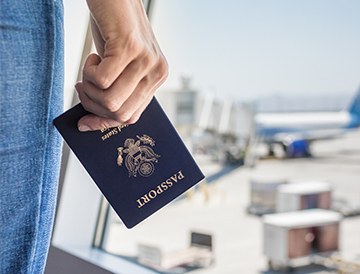
Speculation of a recession continues, yet OTAs have a track record of resilience during times of economic hardship, when consumers prize finding the best value. According to Phocuswright's latest travel research report, U.S. Online Travel Agencies: Key Developments , though OTA growth will slow amid a more complex set of competitive threats, U.S. OTAs will continue to grow their top line in 2020. Here are 5 key developments that have major implications for the future of the OTA marketplace:
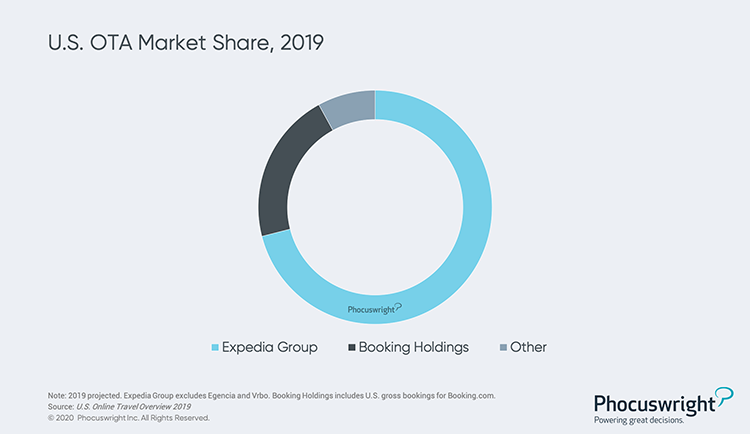
- Leadership Musical Chairs Management changes at the very top beginning in 2017 marked a new era for U.S. OTAs. Reasons include consolidation of brand oversight, cultivation of long-term efficiency, cross-brand collaboration and strategy disagreements.
- The G Word Regardless of whether Google can yet be categorized as an OTA competitor, its outsized role as a search/advertising platform – and customer gatekeeper – is creating rough waters for OTAs.
- A Duopoly Antidote? Can Airbnb make inroads into aviation or any other transportation sector? It's alluded to the possibility of moving into the air business for several years and hired Fred Reid as global head of transportation in 2019. As Airbnb sets its sights on a 2020 IPO, the company is signaling that its ambitions to take on traditional OTAs should be taken seriously.
- Power of Prime A large share of travelers embrace the prospect of booking on Amazon, with 42% indicating they would likely book with Amazon over their current method.
To read further analysis of each key development, purchase the report here .
To give access of this report (plus Phocuswright's entire research library) to your entire company, subscribe to Open Access . Curious about who is an Open Access subscriber? Scroll to the bottom of this page for readership demographics.
What is Open Access
An Open Access subscription provides company-wide access to the whole library of Phocuswright’s travel research and data visualization.
Curious? Contact our team to learn more:
What is open access+.
With Open Access+, your company gets access to Phocuswright's full travel research library and data visualization PLUS Special Project deliverables.
Provide your information and we'll contact you:
Curious contact our team to learn more:, more research insights.
- abbreviation
- word in meaning
Examples: NFL , NASA , PSP , HIPAA , random Word(s) in meaning: chat "global warming" Postal codes: USA: 81657 , Canada: T5A 0A7
What does OTA stand for?
Your abbreviation search returned 60 meanings
- MLA style: "OTA." Acronym Finder . 2024. AcronymFinder.com 16 Jun. 2024 https://www.acronymfinder.com/OTA.html
- Chicago style: Acronym Finder . S.v. "OTA." Retrieved June 16 2024 from https://www.acronymfinder.com/OTA.html
- APA style: OTA. (n.d.) Acronym Finder. (2024). Retrieved June 16 2024 from https://www.acronymfinder.com/OTA.html
- Category Filters
- All definitions (60)
- Information Technology (11)
- Military & Government (16)
- Science & Medicine (13)
- Organizations, Schools, etc. (20)
- Business & Finance (12)
- Slang, Chat & Pop culture (8)
Sort results: alphabetical | rank ?
Note: We have 167 other definitions for OTA in our Acronym Attic
- suggest new definition
Search for OTA in Online Dictionary Encyclopedia
- Abbreviation Database Surfer
- « Previous
- Next »
- OT&ECIP

IMAGES
VIDEO
COMMENTS
What is an OTA in travel? Online travel agents are basically traditional travel agents, except customers self-serve, as they operate online. They are websites where consumers can conduct multiple searches, and plan and place an order for a booking. ... OTAs have revolutionized the tourism industry by providing a platform that enables tour and ...
Kayak. Priceline. Orbitz. You know them, and maybe you even swear by them to book your flights or hotels. These names and many more are online travel agencies, or OTAs. From the big names to the small, these are some of the most popular flight search engines to hunt for a bargain. And while we tell readers that there's no search engine out ...
An online travel agency (OTA) is a website that acts as a search engine for travel. They connect providers across the travel industry to help travelers easily plan their trips. On OTA sites, travelers can often access package deals with accommodations, airfare, cruises, rental cars, and more. Over the years, online travel agencies (OTAs) have ...
An OTA (Online Travel Agency) is a website or platform that allows travelers to book travel-related services such as flights, hotels, rental cars, and vacation rentals. Learn more about OTAs, how they work, and how property managers can use them for maximum benefit.
Online travel agencies are companies that sell you flights, online. They act as a middleman between airlines and consumers, though their prices can often be cheaper than booking direct. Most people are familiar with top OTAs like Expedia, Orbitz, Travelocity, Hopper, and Priceline. There are hundreds, if not thousands, of smaller OTAs as well ...
An online travel agency (OTA) arranges and sells accommodations, tours, transportation and trips on an online platform for travelers. They are third parties who sell services on behalf of other companies. Usually, these OTAs offer many benefits with added convenience with more of a self-service approach. They also include a built-in booking ...
TripShock is a niche OTA focused on tourism excursions in and around the Gulf of Mexico and the Southeast. The Florida-based OTA offers activities in over 40 destinations spanning the region, including 1,000 tours, tourist attractions, and outdoor activities mostly suitable for individuals, couples, or families.
An online travel agency is a website where travelers can book flights, hotels, rental cars, cruises, tours, vacation packages, short term rentals, and more. The first OTAs launched in 1996: Travelocity, which stemmed from a partnership between American Airlines and Sabre, and Expedia, which was created from a partnership between Microsoft and ...
OTA. Online travel agencies (OTAs) offer users the possibility to book their holidays online. Well-known platforms such as Booking, HRS, or Expedia provide additional information like hotel reviews, travel tips, or package holidays. Often OTAs also act as tour operators. Hotels and tourism-related businesses can register to reach potential guests.
OTA stands for: Online Travel Agency. OTAs are online companies whose websites allow consumers to book various travel related services directly via Internet. They are 3rd party agents reselling trips, hotels, cars, flights, vacation packages etc. provided / organised by others. Travel shopping via online agencies has become very popular nowadays.
In short, an OTA is an online travel agency that allows users to book flights, hotels, car rentals, and more in one convenient place. While there are certainly benefits to using OTAs such as convenience and access to exclusive deals, it's important to be aware of potential drawbacks such as hidden fees and lack of flexibility.
Definition of Online Travel Agencies (OTAs) ... 🤨 Are there any drawbacks to booking through an OTA? ... VP of Global Sales at Mize, with over 20 years of experience, has led high-performance teams in major companies in the tourism industry, as well as in the public sector. He has successfully undertaken ventures, including a DMO and ...
What Is An Online Travel Agency? An Online Travel Agency (OTA) is an online or app-based marketplace where consumers can browse, book, and pay for hotel rooms, transportation, lodging, airfare, restaurants, and experiences. Customers book directly with the OTA and the OTA confirms with the service provider. Therefore, the OTA has a relationship ...
The definition of an online travel agency (OTA) is a website that sells travel-related products, including airline tickets, car rentals, cruises, experiences, accommodations and more. Vacation rental managers would utilize OTAs that specialize in renting temporary housing to travelers. Some well-known OTAs in this category include Airbnb ...
OTAs also offer personalized recommendations based on the user's interests and traveling patterns. There's no doubt that the trend of travel bookings are moving online: 90% of travelers conduct their research online. 82% of travelers end up booking online. 76% of hotel shoppers book online via OTA. A survey revealed the top 10 reasons ...
An online travel agency or OTA is a business that allows users to search and book travel products such as air tickets, lodging, car rentals, tours, cruises, and more. In other words, OTAs are intermediaries between travel inventory suppliers (airlines, hotels, tour operators, etc.) and customers (usually they are travelers or other OTAs). OTAs ...
Meanwhile, France's domestic OTA travelers spend 8 percent more than direct bookers on accommodations, 5 percent more at on-property restaurants, and 26 percent more on hotel bar services. 2 ...
OTA is an abbreviation for online travel agency, which is a web-based marketplace on which aspiring tourists can research and book travel arrangements. These third-party sites allow anyone to easily search for and compare products and services without the aid (or extra costs) of a travel agent.
Here are 5 key developments that have major implications for the future of the OTA marketplace: The Search for Synergy. The biggest U.S. OTAs work to increase synergies across their various brands. Booking Holdings is placing heavy emphasis on building out what it calls the "connected trip", increasing the cross-pollination of its previously ...
Online travel agencies (OTAs) are expanding their services to many segments of the travel and tourism industry. While they are beneficial to travelers, OTAs also face a great deal of consumer ...
1. The growth of Online Travel Agencies (OTAs) over the last decade has posed both real opportunities and major risks for the hospitality industry. These positives and challenges are particularly pronounced for independent properties around the world - both larger hotels/resorts and smaller, owner operators. Such properties, regardless of ...
What is OTA meaning in Tourism? 5 meanings of OTA abbreviation related to Tourism: Vote. 1. Vote. OTA. Official Travel Agent. Travel, Sport. Travel, Sport.
OTA: Old Town Alexandria (Alexandria, VA) OTA: Organized Team Activity: OTA: Oxford Text Archive (UK) OTA: Operational Transconductance Amplifier: OTA: Old Timers Association (various organizations) OTA: Over-The-Air Management: OTA: Optical Trapping Applications: OTA: One Touch Access (Nokia) OTA: Office of Tribal Affairs (Agency for Toxic ...